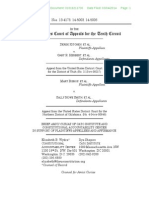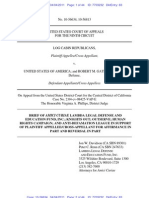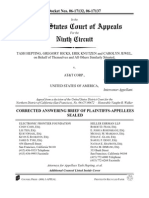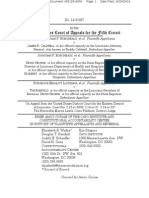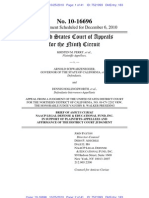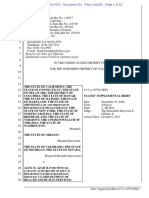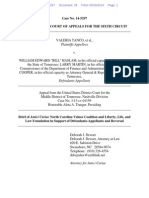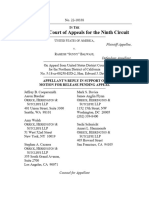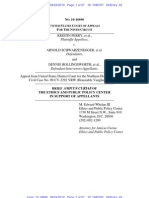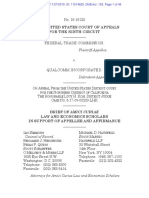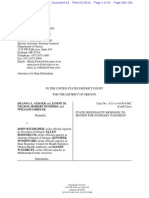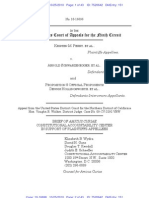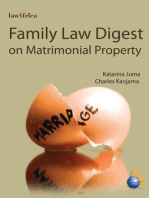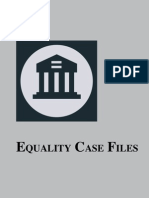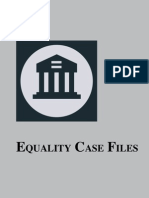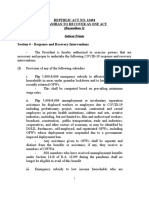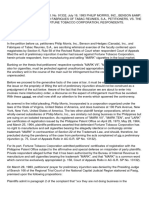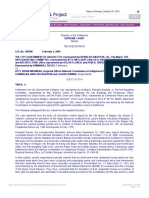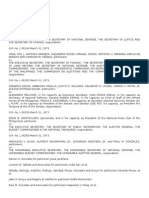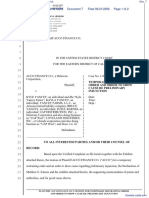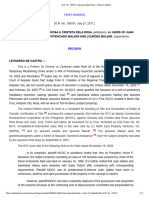United States Court of Appeals: Appellant
United States Court of Appeals: Appellant
Uploaded by
Equality Case FilesCopyright:
Available Formats
United States Court of Appeals: Appellant
United States Court of Appeals: Appellant
Uploaded by
Equality Case FilesOriginal Description:
Original Title
Copyright
Available Formats
Share this document
Did you find this document useful?
Is this content inappropriate?
Copyright:
Available Formats
United States Court of Appeals: Appellant
United States Court of Appeals: Appellant
Uploaded by
Equality Case FilesCopyright:
Available Formats
Case: 13-4429
Document: 003111545347
13-4429
IN THE
Page: 1
Date Filed: 02/27/2014
United States Court of Appeals
FOR THE THIRD CIRCUIT
TARA KING, ED. D. individually and on behalf of her patients; RONALD NEWMAN, PH. D., individually and on behalf of his patients; NATIONAL ASSOCIATION FOR R ESEARCH AND T HERAPY OF H OMOSEXUALITY, (N ARTH ); A MERICAN ASSOCIATION OF CHRISTIAN COUNSELORS, Appellant, v. GOVERNOR OF THE STATE OF NEW JERSEY; ERIC T. KANEFSKY, DIRECTOR OF THE N EW J ERSEY D EPARTMENT OF L AW AND P UBLIC S AFETY: D IVISION OF CONSUMER AFFAIRS, in his official capacity; MILAGROS COLLAZO, EXECUTIVE DIRECTOR OF THE NEW JERSEY BOARD OF MARRIAGE AND FAMILY THERAPY E XAMINERS , in her official capacity; J. M ICHAEL WALKER , E XECUTIVE DIRECTOR OF THE NEW JERSEY BOARD OF PSYCHOLOGICAL EXAMINERS, in his official capacity; PAUL JORDAN, PRESIDENT OF THE NEW JERSEY STATE BOARD OF M EDICAL E XAMINERS , in his official capacity; GARDEN S TATE E QUALITY, Appellees.
ON APPEAL FROM THE UNITED STATES DISTRICT COURT FOR THE DISTRICT OF NEW JERSEY
BRIEF FOR APPELLEE GARDEN STATE EQUALITY
MICHAEL GLUCK ANDREW BAYER GLUCKWALRATH LLP 428 River View Plaza Trenton, New Jersey 08611 (609) 278-3900 SHANNON P. MINTER CHRISTOPHER F. STOLL AMY WHELAN NATIONAL CENTER FOR LESBIAN RIGHTS 870 Market Street, Suite 370 San Francisco, California 94102 (415) 392-6257
FRANK HOLOZUBIEC DAVID S. FLUGMAN SHIREEN A. BARDAY ANDREW C. ORR KIRKLAND & ELLIS LLP 601 Lexington Avenue New York, New York 10022 (212) 446-4800 and ANDREW J. WELZ KIRKLAND & ELLIS LLP 655 Fifteenth Street, NW Washington, D.C. 20005 (202) 879-5000
Attorneys for Appellee Garden State Equality
Case: 13-4429
Document: 003111545347
Page: 2
Date Filed: 02/27/2014
CORPORATE DISCLOSURE STATEMENT Pursuant to Federal Rule of Appellate Procedure 26.1, and Third Circuit Local Appellate Rule 26.1, Garden State Equality hereby makes the following disclosures: 1. For non-governmental corporate parties please list all parent corporations: None 2. For non-governmental corporate parties please list all publicly held companies that hold 10% or more of the partys stock: None 3. If there is a publicly held corporation which is not a party to the proceeding before this Court but which has as a financial interest in the outcome of the proceeding, please identify all such parties and specify the nature of the financial interest or interests: None 4. In all bankruptcy appeals counsel for the debtor or trustee of the bankruptcy estate must list: 1) the debtor, if not identified in the case caption; 2) the members of the creditors committee or the top 20 unsecured creditors; and, 3) any entity not named in the caption which is active participant in the bankruptcy proceeding. If the debtor or trustee is not participating in the appeal, this information must be provided by appellant. N/A
Case: 13-4429
Document: 003111545347
Page: 3
Date Filed: 02/27/2014
TABLE OF CONTENTS Page STATEMENT OF RELATED CASES AND PROCEEDINGS .............................. 1 COUNTERSTATEMENT OF THE ISSUES ON REVIEW .................................... 1 COUNTERSTATEMENT OF THE CASE ............................................................... 2 COUNTERSTATEMENT OF FACTS ..................................................................... 4 A. B. A3371 And Its Enactment. .................................................................... 4 Procedural History Below ................................................................... 11
SUMMARY OF ARGUMENT ............................................................................... 13 STANDARD OF REVIEW ..................................................................................... 15 ARGUMENT ........................................................................................................... 16 I. THE DISTRICT COURT CORRECTLY HELD THAT A3371 DOES NOT VIOLATE APPELLANTS FREE SPEECH RIGHTS. ...................... 16 A. B. C. D. The District Court Correctly Held That A3371 Is Subject To Rational Basis Review. ....................................................................... 16 The District Court Correctly Held That A3371 Easily Satisfies Rational Basis Review. ....................................................................... 20 The Speech Cases On Which Appellants Rely Are Inapposite. ......... 22 Although Appellants Cannot Show That SOCE Constitutes Inherently Expressive Conduct Triggering Intermediate Scrutiny Under OBrien, A3371 Would Survive Scrutiny Under That Standard. ..................................................................................... 24
II.
THE DISTRICT COURT CORRECTLY HELD THAT A3371 IS NEITHER VAGUE NOR OVERBROAD. ................................................... 27 A. A3371 Is Not Vague. ........................................................................... 27 i
Case: 13-4429
Document: 003111545347
Page: 4
Date Filed: 02/27/2014
1. 2.
The Term Sexual Orientation Is Not Vague. ........................ 29 A3371 Defines Sexual Orientation Change Efforts Sufficiently To Allow Mental Health Professionals To Understand What It Prohibits.................................................... 30 None Of Appellants Hypotheticals Are Sufficient To Establish That A3371 Is Vague. ............................................... 31
3. B. III. IV.
A3371 Is Not Overbroad. .................................................................... 34
THE DISTRICT COURT CORRECTLY HELD THAT A3371 DOES NOT VIOLATE THE FREE EXERCISE CLAUSE. ................................... 35 THE DISTRICT COURT CORRECTLY HELD THAT APPELLANTS LACK STANDING TO ASSERT CLAIMS ON BEHALF OF THIRD PARTIES. ...................................................................................................... 40 THE DISTRICT COURT PROPERLY GRANTED GARDEN STATE EQUALITYS MOTION TO INTERVENE AS A PARTYDEFENDANT IN THIS LITIGATION. ....................................................... 44
V.
CONCLUSION ........................................................................................................ 51
ii
Case: 13-4429
Document: 003111545347
Page: 5
Date Filed: 02/27/2014
TABLE OF AUTHORITIES Page Cases Agency for Intl Dev. v. Alliance for Open Socy Intl, Inc., 133 S. Ct. 2321 (2013) .................................................................................................. 22 Am. Auto. Ins. Co. v. Murray, 658 F.3d 311 (3d Cir. 2011) ......................................................................................... 45 Am. Civil Liberties Union v. Ashcroft, 322 F.3d 240 (3d Cir. 2003) ......................................................................................... 21 Bartnicki v. Vopper, 200 F.3d 109 (3d Cir. 1999), affd, 532 U.S. 514 (2001) ............................................................................................ 18 Blackhawk v. Pennsylvania, 381 F.3d 202 (3d Cir. 2004) .............................................................................36, 37, 38 Blass v. Weigel, 85 F. Supp. 775 (D.N.J. 1949)...................................................................................... 17 Brandenburg v. Ohio, 395 U.S. 444 (1969) ...................................................................................................... 19 Brody ex. rel. Sugzdinis v. Spang, 957 F.2d 1108 (3d Cir. 1992) ....................................................................................... 16 Brown v. City of Pittsburgh, 586 F.3d 263 (3d Cir. 2009) ...................................................................................27, 40 C.N. v. Ridgewood Bd. of Educ., 430 F.3d 159 (3rd Cir. 2005) ........................................................................................ 44 Chiles v. Thornburgh, 865 F.2d 1197 (11th Cir. 1989) .................................................................................... 47 Church of the Lukumi Babalu Aye, Inc. v. City of Hialeah, 508 U.S. 520 (1993) ................................................................................... 35, 36, 38, 39 iii
Case: 13-4429
Document: 003111545347
Page: 6
Date Filed: 02/27/2014
City of Dallas v. Stanglin, 490 U.S. 19 (1989) ........................................................................................................ 19 Coca-Cola Bottling Co. of Elizabethtown, Inc. v. The Coca-Cola Co., 696 F. Supp. 57 (D. Del. 1988), affd, 988 F.2d 386 (3d Cir. 1993) ......................... 48 Coggeshall v. Mass. Bd. of Registration of Psychologists, 604 F.3d 658 (1st Cir. 2010)......................................................................................... 17 Combs v. HomerCenter Sch. Dist., 540 F.3d 231 (3d Cir. 2008) ......................................................................................... 40 Conant v. Walters, 309 F.3d 629 (9th Cir. 2002) ........................................................................................ 22 Conchatta Inc. v. Miller, 458 F.3d 258 (3d Cir. 2006) ......................................................................................... 26 Cunningham v. State, 452 F. Supp. 2d 591 (D.N.J. 2006) .............................................................................. 19 Dept of Commerce v. U.S. House of Representatives, 525 U.S. 316 (1999) ...................................................................................................... 48 Deville v. Givaudan Fragrances Corp., 419 F. Appx 201 (3d Cir. 2011).................................................................................. 15 Diamond v. Charles, 476 U.S. 54 (1986) ..................................................................................................45, 48 Dir., Office of Workers Comp. Programs, U.S. Dept of Labor v. Perini N. River Assocs., 459 U.S. 297 (1983) ...................................................................................................... 48 Doe ex rel. Doe v. Lower Merion Sch. Dist., 665 F.3d 524 (3d Cir. 2011), cert. denied, 132 S. Ct. 2773 (2012) ............................................................................ 20 Eatough v. Albano, 673 F.2d 671 (3d Cir. 1982) ......................................................................................... 20
iv
Case: 13-4429
Document: 003111545347
Page: 7
Date Filed: 02/27/2014
Fraternal Order of Police Newark Lodge No. 12 v. City of Newark, 170 F.3d 359 (3d Cir. 1999) ......................................................................................... 39 Greer v. Amesqua, 212 F.3d 358 (7th Cir. 2000) ........................................................................................ 29 Griswold v. Connecticut, 381 U.S. 479 (1965) ...................................................................................................... 42 Hill v. Colorado, 530 U.S. 703 (2000) ................................................................................................28, 33 Hobbie v. Unempt Appeals Commn of Fla., 480 U.S. 136 (1987) ...................................................................................................... 39 Holder v. Humanitarian Law Project, 130 S. Ct. 2705 (2010) ......................................................................................25, 28, 31 Hollingsworth v. Perry, 133 S. Ct. 2652 (2013) ......................................................................................46, 48, 49 Hoots v. Pennsylvania, 672 F.2d 1133 (3d Cir. 1982) ....................................................................................... 50 Hunt v. Wash. State Apple Adver. Commn, 432 U.S. 333 (1977) ...................................................................................................... 46 Hyman v. City of Louisville, 132 F. Supp. 2d 528 (W.D. Ky. 2001), vacated on other grounds, 53 F. Appx 740 (6th Cir. 2002) ...................................... 29 Indian River Recovery Co. v. The China, 108 F.R.D. 383 (D. Del. 1985) ..................................................................................... 48 Keyishian v. Bd. of Regents of the Univ. of the State of N.Y., 385 U.S. 589 (1967) ...................................................................................................... 31 Kleissler v. U.S. Forest Serv., 157 F.3d 964 (3d Cir. 1998) ......................................................................................... 50
Case: 13-4429
Document: 003111545347
Page: 8
Date Filed: 02/27/2014
Kost v. Kozakiewicz, 1 F.3d 176 (3d Cir.1993) .............................................................................................. 41 Legal Services Corp. v. Velazquez, 531 U.S. 533 (2001) ...................................................................................................... 23 Lighthouse Inst. for Evangelism, Inc. v. City of Long Branch, 510 F.3d 253 (3d Cir. 2007) ......................................................................................... 39 Lujan v. Defenders of Wildlife, 504 U.S. 555 (1992) ...................................................................................................... 46 Mausolf v. Babbitt, 85 F.3d 1295 (8th Cir. 1996) ........................................................................................ 47 McTernan v. City of York, Pa., 564 F.3d 636 (3d Cir. 2009) ......................................................................................... 40 Montanye v. Wissahickon Sch. Dist., 218 F. Appx 126 (3d Cir. 2007)............................................................................19, 24 N.C.A.A. v. Governor of N.J., 520 F. Appx 61 (3d Cir. 2013) .................................................................................... 49 Natl Assn for Advancement of Psychoanalysis v. Cal. Bd. of Psychology, 228 F.3d 1043 (9th Cir. 2000) ...................................................................................... 16 New York v. Ferber, 458 U.S. 747 (1982) ...................................................................................................... 26 Non-Resident Taxpayers Assn v. Municipality of Phila., 341 F. Supp. 1139 (D.N.J. 1971), affd, 478 F.2d 456 (3d Cir. 1973)....................... 19 Pa. Psychiatric Socy v. Green Spring Health Servs., Inc., 280 F.3d 278 (3d Cir. 2002) ...................................................................................41, 42 Pickup v. Brown, 728 F.3d 1042 (9th Cir. 2013) ........................................................................................ 3 Pickup v. Brown, 740 F.3d 1208 (9th Cir. 2014) ...............................................................................passim
vi
Case: 13-4429
Document: 003111545347
Page: 9
Date Filed: 02/27/2014
Pickup v. Brown, No. 2:12CV02497KJMEFB, 2012 WL 6021465 (E.D. Cal. Dec. 4, 2012)................................................................................................ 25 Pittsburgh League of Young Voters Educ. Fund v. Port Auth. of Allegheny Cnty., 653 F.3d 290 (3d Cir. 2011) ......................................................................................... 15 Planned Parenthood of Se. Pa. v. Casey, 505 U.S. 833 (1992) ...................................................................................................... 17 Powers v. Ohio, 499 U.S. 400 (1991) ...................................................................................................... 41 Prince v. Massachusetts, 321 U.S. 158 (1944) ...................................................................................................... 44 R.A.V. v. St. Paul, Minn., 505 U.S. 377 (1991) ...................................................................................................... 18 Rice v. Paladin Enters., 128 F.3d 233 (4th Cir. 1997) ........................................................................................ 19 Roe v. Wade, 410 U.S. 113 (1973) ...................................................................................................... 46 Rosenberger v. Rector & Visitors of Univ. of Va., 515 U.S. 819 (1995) ...................................................................................................... 23 Rumsfeld v. Forum for Academic & Institutional Rights, Inc., 547 U.S. 47 (2006) ..................................................................................................24, 46 Sable Commcns of Cal., Inc. v. F.C.C., 492 U.S. 115 (1989) ...................................................................................................... 21 Singleton v. Wulff, 428 U.S. 106 (1976) ................................................................................................41, 42 Sorrell v. IMS Health, Inc., 131 S. Ct. 2653 (2011) .................................................................................................. 22
vii
Case: 13-4429
Document: 003111545347
Page: 10
Date Filed: 02/27/2014
Sosna v. Iowa, 419 U.S. 393 (1975) ...................................................................................................... 46 Spence v. State of Wash., 418 U.S. 405 (1974) ...................................................................................................... 24 TBS, Inc. v. F.C.C., 512 U.S. 622 (1994) ...................................................................................................... 18 Texas v. Johnson, 491 U.S. 397 (1989) ...................................................................................................... 24 Thomas v. Collins, 323 U.S. 516 (1945) ...................................................................................................... 23 United States v. Germantown Settlement Homes, Inc., No. 84-2622, 1985 U.S. Dist. LEXIS 18193 (E.D. Pa. Jul. 5, 1985) ........................ 48 United States v. Jenkins, 909 F. Supp. 2d 758 (E.D. Ky. 2012) .......................................................................... 29 United States v. Kosma, 951 F.2d 549 (3d Cir. 1991) ......................................................................................... 15 United States v. OBrien, 391 U.S. 367 (1968) ................................................................................................24, 26 United States v. Raines, 362 U.S. 17 (1960) ........................................................................................................ 33 Vill. of Arlington Heights v. Metro. Housing Dev. Corp., 429 U.S. 252 (1977) ...................................................................................................... 48 Vill. of Hoffman Estates v. Flipside, Hoffman Estates, Inc., 455 U.S. 489 (1982) ...................................................................................................... 27 Virginia v. Hicks, 539 U.S. 113 (2003) ...................................................................................................... 34 Washington v. Glucksberg, 521 U.S. 702 (1997) ...................................................................................................... 21
viii
Case: 13-4429
Document: 003111545347
Page: 11
Date Filed: 02/27/2014
Washington v. Klem, 497 F.3d 272 (3d Cir. 2007) ......................................................................................... 38 Watson v. Maryland, 218 U.S. 173 (1910) ................................................................................................20, 26 Wiley Mission v. State, Civil Action No. 10-cv-03024 (RBK) (JS), 2011 WL 3841437 (D.N.J. Aug. 25, 2011) ........................................................................................................................ 40 Statutes N.J. STAT. ANN. 45:14B-8 ............................................................................................... 38 N.J. STAT. ANN. 45:15 ..................................................................................................... 38 N.J. STAT. ANN. 45:1-54 ...........................................................................................passim N.J. STAT. ANN. 45:1-55 ............................................................................... 30, 32, 33, 36 N.J. STAT. ANN. 45:8B-48 ............................................................................................... 38 N.J. STAT. ANN. 45:9-18.1............................................................................................... 38 Rules FED. R. APP. P. 30(b)(1) ........................................................................................................ 5 Fed. R. Civ. P. 24(b) .................................................................................................2, 15, 49 Other Authorities 7C Wright, Miller, and Kane, Federal Practice & Procedure: Civil 2d 1917 (2d ed. 1986) ........................................................................................................................ 47
ix
Case: 13-4429
Document: 003111545347
Page: 12
Date Filed: 02/27/2014
STATEMENT OF RELATED CASES AND PROCEEDINGS Neither this case nor any related case has been litigated previously in this Court. On November 1, 2013, a related case, Doe v. Christie, Case No.
3:13-cv-06629 (FLW) (LHG) was filed in the United States District Court for the District of New Jersey. The plaintiffs in the Doe case challenge the law at issue in this case on substantially similar grounds and are represented by the same counsel as Plaintiffs-Appellants (Appellants) here. The case is assigned to the same judge who heard this case below. The plaintiffs in the Doe case filed a motion for preliminary injunction on November 1, 2013; the motion has been fully briefed and remains pending before the District Court. COUNTERSTATEMENT OF THE ISSUES ON REVIEW 1. Whether the District Court correctly held that New Jersey Statutes
45:1-54 et seq. (Assembly Bill 3371 or A3371), which prohibits licensed mental health professionals from engaging in sexual orientation change efforts with patients under 18 years of age, does not infringe Appellants rights to freedom of speech, where the state legislature found that those practices present serious health risks to minors based on the conclusions of all leading medical and mental health organizations. 2. Whether the District Court correctly held that A3371 is neither
unconstitutionally vague nor overbroad.
Case: 13-4429
Document: 003111545347
Page: 13
Date Filed: 02/27/2014
3.
Whether the District Court correctly held that A3371 does not violate
Appellants rights to the free exercise of religion because the law is facially neutral with respect to religion, there is no evidence that passage of the law was motivated by religious concerns, and the law is generally applicable to all licensed mental health professionals. 4. Whether the District Court correctly held that Appellants lack
standing to assert claims on behalf of their minor clients. 5. Whether the District Court abused its discretion in granting Garden
State Equalitys motion for permissive intervention pursuant to Federal Rule of Civil Procedure 24(b)(1). COUNTERSTATEMENT OF THE CASE New Jersey Assembly Bill Number 3371, a law enacted by the legislature of New Jersey and signed into law by Governor Christopher J. Christie on August 19, 2013, does one thing and one thing only: prohibits mental health professionals licensed by the state of New Jersey from engaging in conduct that seeks to change the sexual orientation of minor patients. Before passing the bill by overwhelming margins in both houses, the New Jersey legislature heard and considered substantial evidence and testimony, including statements from survivors of socalled sexual orientation change efforts (SOCE) and the nations most prominent mental health organizations, and reached the conclusion that New
Case: 13-4429
Document: 003111545347
Page: 14
Date Filed: 02/27/2014
Jersey has a compelling interest in protecting the physical and psychological wellbeing of minors and in protecting them from serious harms caused by sexual orientation change efforts. N.J. STAT. ANN. 45:1-54(n). The extensive record developed by the New Jersey legislature during these hearings provided ample support for these conclusions. New Jersey was not the first state to prohibit the SOCE practices proscribed by A3371; in 2012, California enacted a law which banned licensed therapists from engaging in the same practices with minors in that state. Two lawsuits were filed challenging the California law and in August of 2013, a panel of the Ninth Circuit Court of Appeals upheld the California law, holding that it does not abridge licensed therapists freedom of speech. Pickup v. Brown, 728 F.3d 1042, 1056 (9th Cir. 2013). The full Ninth Circuit recently denied the plaintiffs motion for en banc review, allowing the August panel decision to stand. Pickup v. Brown, 740 F.3d 1208, 1214 (9th Cir. 2014). Appellants here advance nearly identical arguments to the ones that were rejected by the Ninth Circuit in Pickup. Like the plaintiffs in Pickup, Appellants argue that A3371 burdens their freedom of speech in violation of the First Amendment United States Constitutioneven though A3371, like the California law, does not prohibit mental health providers from communicating their views about SOCE publicly, prevent those providers from expressing their views on
Case: 13-4429
Document: 003111545347
Page: 15
Date Filed: 02/27/2014
SOCE or any other topic to their patients, or prevent providers from recommending SOCE to any patient. As explained below, the District Court properly held that A3371 regulates conduct, rather than speech, and that proscribing licensed therapists in New Jersey from engaging in SOCE with minors was a proper exercise of the legislatures power to regulate the medical and mental health professions, just as the Ninth Circuit found with respect to the California law. The District Court also properly held that A3371 does not violate the First Amendments guarantee of free exercise of religion. A3371which applies only to licensed therapists and not to
counseling by unlicensed persons, such as members of the clergyis a neutral law of general applicability that does not implicate the Free Exercise Clause. Put simply, A3371 is a legitimate and rational effort by the state of New Jersey to protect its vulnerable youth from the dangers of scientifically discredited and unsafe treatment practices designed to change their sexual orientation. This Court should affirm the District Courts grant of summary judgment in favor of the Appellees. COUNTERSTATEMENT OF FACTS A. A3371 And Its Enactment.
New Jersey enacted A3371 to prevent state-licensed mental health professionals from subjecting patients under 18 years of age to scientifically
Case: 13-4429
Document: 003111545347
Page: 16
Date Filed: 02/27/2014
discredited and unsafe attempts to change their sexual orientation or gender identity. N.J. STAT. ANN. 45:1-54. Attempts to use therapy or other
psychological techniques to change sexual orientation date to at least the midtwentieth century, at a time when most practitioners wrongly assumed that being gay, lesbian, or bisexual was a disease. (Supplemental Appendix (SA)1 148, 155-56 (Declaration of Gregory Herek, Ph.D. (Herek Decl.).)2 Based on that false assumption, many mental health professionals tried to cure LGBT people using techniques that included psychotherapy, hormone treatments, aversive conditioning with nausea-inducing drugs, lobotomy, electroshock, and castration. (Id. at 155-56.) Homosexuality was removed from the Diagnostic and Statistical Manual of Mental Disorders in 1973, and since that time, most practitioners have stopped Appellants filed an appendix with this Court without conferring with Appellees or allowing Appellees to designate additional part of the record for a joint appendix. See FED. R. APP. P. 30(b)(1). Appellee-Garden State Equality has moved for leave to file a supplemental appendix, which this brief will cite herein as SA. This Court, like the District Court did below, can and should uphold A3371 solely based upon the record developed by the New Jersey legislature. Copies of the materials considered by the legislature are attached to the Affirmation of Andrew Bayer, included in Garden State Equalitys proposed Supplemental Appendix. (SA 204-35.) In addition, Garden State Equality has included in the proposed Supplemental Appendix the three expert declarations submitted in the proceedings below in response to the affidavits submitted by Appellants, as well as the declaration submitted by the State Appellees for that same purpose, to complete the record as submitted by Appellants in their Appendix in the event the Court wishes to look beyond the legislative record. 5
2 1
Case: 13-4429
Document: 003111545347
Page: 17
Date Filed: 02/27/2014
engaging in efforts to change sexual orientation.
(Id. at 149, 156.)
Once
homosexuality was no longer classified as an illness, the rationale for trying to cure it by changing an individuals sexual orientation ceased to exist. (Id. at 56.) Despite the medical and mental health professions conclusion more than 40 years ago that being gay, lesbian, or bisexual is not a condition that requires change or treatment, some practitioners have continued to employ techniques designed to change their patients sexual orientation based on the false premise that being gay, lesbian, or bisexual is an abnormal condition that can or should be changed. (App. 3093 (Herek Decl., Ex. C, American Psychological Association, Report of the American Psychological Association Task Force on Appropriate Therapeutic Responses to Sexual Orientation (2009) (APA Task Force Report)); SA 82-83 (Declaration of Douglas Haldeman, Ph.D. (Haldeman Decl.)).) In recent years, practitioners of sexual orientation change efforts have more commonly used forms of talk therapy rather than surgical, pharmacological, or aversive methods. Yet while these methods appear less extreme than some prior methods, the nations leading medical and mental health organizations have found that these practices also lack any scientific basis and present significant risks of physical and mental harm to patients who undergo them. For example, the
American Psychological Association (the APA) has warned that sexual
3
Garden State Equality cites to the Appellants appendix herein as App. 6
Case: 13-4429
Document: 003111545347
Page: 18
Date Filed: 02/27/2014
orientation change efforts can pose critical health risks to lesbian, gay, bisexual, and transgender (LGBT) people, including confusion, depression, guilt, helplessness, hopelessness, shame, social withdrawal, [and] suicidality, among other negative consequences. N.J. STAT. ANN. 45:1-54(b). In particular, the APA determined that the potential risks of reparative therapy are great, including depression, anxiety, and self-destructive behavior. Id. 45:1-54(d)(2). And the American Academy of Child and Adolescent Psychiatry found that there is [neither] evidence that sexual orientation can be altered through therapy, no[r] any medically valid basis for attempting to prevent homosexuality, which is not an illness. Id. 45:1-54(k).4 In enacting A3371, the New Jersey Legislature considered and relied upon each of these professional organizations conclusions, as well as similar statements from the American School Counselor Association, American Academy of Pediatrics, American Medical Association, National Association of Social Workers, American Counseling Association, American Psychoanalytic
Some practitioners of SOCE claim that childhood sexual abuse may cause some individuals to develop same-sex attractions and that SOCE is an appropriate treatment for sexual abuse-victims. (See, e.g., App. 196-97 (Declaration of Dr. Christopher Rosik).) However, there is no credible evidence that sexual abuse can change a persons sexual orientation, and of the several well-established treatment protocols for victims of sexual abuse, not one includes attempting to change the victims sexual orientation. (See SA 132-33, 136-37 (Declaration of Laura Davies, M.D.).) 7
Case: 13-4429
Document: 003111545347
Page: 19
Date Filed: 02/27/2014
Association, and Pan American Health Organization (a regional office of the World Health Organization). Id. 45:1-54(e)-(j), (l). These organizations have
stated that sexual orientation change efforts (1) are unnecessary and offer no therapeutic benefit because they attempt to cure something that is not an illness and requires no treatment, (2) are contrary to the modern scientific understanding of sexual orientation, (3) are ineffective, and (4) carry a risk of serious harm to patients. Id. 45:1-54(c), (e)-(j), (l). The Legislature also relied on research demonstrating that the risks of harm are especially great for minors. It cited research concluding that gay, lesbian, and bisexual young adults who experienced high levels of family rejection in adolescence based on their sexual orientation were 8.4 times more likely to report having attempted suicide and 5.9 times more likely to report high levels of depression than peers from families reporting no or low levels of rejection. Id. 45:1-54(m). Numerous witnesses appeared before the Assemblys Committee on Women and Children to support the passage of A3371. Supporters of the bill included the New Jersey Psychological Association, the New Jersey Psychiatric Association, and the American Academy of Pediatrics, New Jersey Chapter. (See SA 209, 21415 (Exhibit 1 to Affirmation of Andrew Bayer (Bayer Aff.), N.J. Assembly Women & Children Committee, Hearing on A3371, June 13, 2013 (witness
Case: 13-4429
Document: 003111545347
Page: 20
Date Filed: 02/27/2014
slips)).5) The National Association of Social Workers, New Jersey Chapter, stated in its letter of support that [n]ot only is there no scientific data to support the success of psychological attempts to change sexual orientation, but these therapies can actually have extremely detrimental effects on patients. (SA 223 (Exhibit 2 to Bayer Aff., Letter from Walter Kalman, MSW, LSW, Exec. Dir., Natl Assn of Soc. Workers, N.J. Chapter to Members of the Assembly Women & Children Committee, June 13, 2013).) Additionally, Dr. Jean Mercer, a
developmental psychologist and professor emerita of psychology, noted that the use of conversion therapies . . . with children and adolescents poses particular ethical problems because [m]inors cannot effectively refuse or resist treatments wanted by their parents or other authorities. (SA 225-26 (Exhibit 3 to Bayer Aff., Testimony of Dr. Jean Mercer, PhD, Prof. Emerita of Psychology, Stockton College, before N.J. Assembly Women & Children Committee, Hearing on A3371, June 13, 2013).) Other witnesses testifying before the legislature included individuals who as minors had been sent to licensed therapists who attempted to change their sexual orientation.
5
These witnesses reported that these efforts were ineffective and
The New Jersey Assembly committees transcribe hearings only at the request of a committee member. An audio recording of the N.J. Assembly Women & Children Committee, June 13, 2013 Hearing on A3371 is available at http://www.njleg.state.nj.us/media/archive_audio2.asp?KEY=AWC&SESSION=2 012. 9
Case: 13-4429
Document: 003111545347
Page: 21
Date Filed: 02/27/2014
succeeded only in causing them great pain and anxiety. Mordechai Levovitz, who underwent sexual orientation change efforts starting when he was six years old because his parents were concerned that his behavior was too feminine, testified that he was made to feel by doctors that there was something wrong with [him] and was made to feel shame and engage in a fruitless labor that left [him] sad and broken. (SA 228-30 (Exhibit 4 to Bayer Aff., Testimony of Modechai Levovitz, Co-Exec. Dir., JQY, before N.J. Assembly Women & Children Committee, Hearing on A3371, June 13, 2013).) Ryan Kendall testified that his experiences with sexual orientation change efforts as a teenager drove him to the brink of suicide and led to depression, periods of homelessness, and drug abuse. (SA 232-33 (Exhibit 5 to Bayer Aff., Testimony of Ryan Kendall before N.J. Assembly Women & Children Committee, Hearing on A3371, June 13, 2013).) In light of the findings of these leading medical and mental health organizations, the cited research, and the testimony presented to its committees, the legislature determined that New Jersey has a compelling interest in protecting the physical and psychological well-being of minors and protecting them from serious harms caused by sexual orientation change efforts. N.J. STAT. ANN. 45:1-54(n).
10
Case: 13-4429
Document: 003111545347
Page: 22
Date Filed: 02/27/2014
B.
Procedural History Below
On August 22, 2013, Appellantstwo therapists licensed by the state of New Jersey and two organizations whose members include licensed professionals who practice or wish to engage in SOCEfiled the instant lawsuit. (See App. 11 November 8, 2013 District Court Opinion (Opinion).) Appellants alleged that A3371 violates their freedom of speech (Counts I, II, and III) and free exercise of religion (Counts IV and V) and also asserted claims on behalf of minor clients and their parents that A3371 interferes with the minors rights to self-determination and the parents fundamental right to direct the upbringing of their children (Count VI). (See id. at 9-10.) Appellants filed a motion for preliminary injunction and temporary restraining order along with their complaint which, with the consent of all parties, later was converted into a motion for summary judgment. (See id. at 11.) On September 6, 2013, Garden State Equality filed a motion to intervene as a party-defendant in order to defend A3371 on behalf of its constituents, who include victims of SOCE in the state of New Jersey. (App. 78, District Court Docket.) A week later, on September 13, 2013, Garden State Equality filed a brief in opposition to Appellants converted motion for summary judgment and simultaneously cross-moved for summary judgment in its favor. (Id. at 79.) The
11
Case: 13-4429
Document: 003111545347
Page: 23
Date Filed: 02/27/2014
State Appellees filed a separate opposition brief and cross-motion for summary judgment on that same day. (Id.) The District Court held oral argument on the parties motions on October 1, 2013, and, on November 8, 2013, issued an opinion (1) granting Garden State Equalitys motion to intervene, (2) denying Appellants motion for summary judgment, and (3) granting State Appellees and Garden State Equalitys motion for summary judgment.6 The District Court rejected Appellants freedom of
speech claims, finding that A3371 regulates the conduct of providing medical treatment and not speech, and their freedom of religion claims on the grounds that A3371 is a law of general applicability that does not impermissibly burden the freedom of religion. (App. 3 (Opinion).) The Court also rejected Appellants claim under the hybrid rights doctrine, noting that this Court has not applied this theory to free exercise claims, and rejected the claims brought on behalf of minors and their parents for lack of standing. (Id. at 10-11, 29.)7
On November 1, 2013, a different set of plaintiffs, represented by the same counsel as Appellants here, filed a separate lawsuit in the U.S. District Court for the District of New Jersey, captioned Doe v. Christie, Case No. 13-cv-6629 (FLW) (LHG), challenging the constitutionality of A3371 on substantially similar grounds as those asserted by Appellants here. The plaintiffs filed a motion for preliminary injunction, which was opposed by Governor Christie (the lone named defendant) and Garden State Equality (who had earlier moved to intervene as a partydefendant). The District Court has not yet ruled on that motion. As the District Court observed, Appellants abandoned their state constitutional claims before that court. (App. 21 (Opinion).) Appellants have thus 12
7
Case: 13-4429
Document: 003111545347
Page: 24
Date Filed: 02/27/2014
Plaintiffs filed their timely notice of appeal on November 12, 2013. SUMMARY OF ARGUMENT None of the arguments raised by Appellants on appeal provide a sufficient basis for this Court to overturn the well-reasoned opinion of the District Court. Indeed, each of the arguments Appellants assert fails as a matter of law. First, A3371 does not violate Appellants rights to freedom of speech guarantees or infringe their minor clients constitutional right to receive information. (Counts I and III.) As the Ninth Circuit recently recognized in
analyzing Californias law, A3371which prohibits only the practice of SOCE is a regulation of conduct, not speech. Courts in this Circuit and across the country have long upheld rational regulations of conduct, including medical treatment, even where that conduct is effectuated through speech. The District Court
correctly held that A3371 is subject to only rational basis review, and that it easily passes constitutional muster under that standard. (See infra at Section I.) Second, the District Court properly rejected Appellants contention that A3371 is unconstitutionally vague and overbroad. As the Ninth Circuit
recognized, the terms sexual orientation or sexual orientation change efforts are both adequately defined in the statute and readily understood by mental health abandoned Counts II and V. In addition, by failing to challenge the District Courts holding that they lack standing to bring claims on behalf their minor clients parents, Appellants have waived that argument, and thus abandoned Count VI as well. (See App. 24 (Opinion).) 13
Case: 13-4429
Document: 003111545347
Page: 25
Date Filed: 02/27/2014
professionalsindeed, Appellants themselves use those terms in describing the practices in which they wish to engage. Likewise, because the professional
conduct regulation enshrined in A3371 has a plainly legitimate sweep, it is not overbroad. (See infra at Section II.) Third, the District Courts ruling that Appellants claim for violation of the free exercise clause of the First Amendment (Count IV) fails because A3371 is a neutral law of general applicability was correct and should be affirmed. As the District Court properly found, A3371 was enacted neither for the purpose of burdening religious practice, nor does it contain exceptions permitting secular practitioners or members of favored religions to engage in the prohibited conduct. To the contrary, A3371 was enacted to protect all minors in the state of New Jersey from treatment that the state reasonably found to be unsafe, and includes no exemptions permitting any licensed professional to engage in the prohibited conduct. (See infra at Section III.) Fourth, Appellants cannot sustain a claim that A3371 infringes the fundamental rights of their clients (Count III), both because they lack standing to do so8 and because courts have routinely upheld laws barring medical treatment the
Indeed, Appellants counsel are currently representing such one minor in the separate Doe litigation pending in the District Court, thus making clear that there is no barrier to minor plaintiffs asserting these sorts of claims on their own behalf. 14
Case: 13-4429
Document: 003111545347
Page: 26
Date Filed: 02/27/2014
state has reasonably deemed ineffective and posing risks of serious harm. (See infra at Section IV.) Finally, the District Court properly permitted Garden State Equality to intervene in this litigation as a defendant pursuant to Federal Rule of Civil Procedure 24(b) (1). The District Court clearly did not abuse its discretion given its finding that Garden State Equality would provide a helpful, alternative viewpoint from the vantage of some persons who have undergone SOCE treatment or are potential patients of treatment that will aid the court in resolving plaintiffs claims fully and fairly (App. 20 (Opinion)). (See infra at Section V.) STANDARD OF REVIEW When reviewing a district courts summary judgment order, this Court considers legal conclusions de novo and reviews factual findings for clear errors. Deville v. Givaudan Fragrances Corp., 419 F. Appx 201, 205 (3d Cir. 2011). While this Court conducts a clear error review of factual findings based on an independent examination of the whole record in First Amendment cases, that review remains deferential to the district courts findings of fact. Pittsburgh
League of Young Voters Educ. Fund v. Port Auth. of Allegheny Cnty., 653 F.3d 290, 298-99 (3d Cir. 2011) (finding no clear error in the underlying findings where the District Court weighed [the defendants evidence] against [the plaintiffs] evidence and found that the [latter was] more compelling[.]); United
15
Case: 13-4429
Document: 003111545347
Page: 27
Date Filed: 02/27/2014
States v. Kosma, 951 F.2d 549, 555 (3d Cir. 1991) ([T]he district courts findings are entitled to great deference by this court, tempered by our obligation of independent review because First Amendment protections are implicated.). With respect to the granting of a motion to intervene, this Court reviews a district courts decision for abuse of discretion. Brody ex rel. Sugzdinis v. Spang, 957 F.2d 1108, 1124 (3d Cir. 1992) (noting that intervention decision is reviewed only for abuse of discretion). ARGUMENT I. THE DISTRICT COURT CORRECTLY HELD THAT A3371 DOES NOT VIOLATE APPELLANTS FREE SPEECH RIGHTS. A. The District Court Correctly Held That A3371 Is Subject To Rational Basis Review.
The District Court correctly rejected Appellants argument that the treatments they wish to administer to minor patients constitute pure speech entitled to the highest level of First Amendment protection. Appellate courts uniformly have rejected the argument, urged by Appellants here, that state regulation of talk therapy is subject to heightened First Amendment review simply because the treatment is provided by means of speech. As the Ninth Circuit observed in upholding a law virtually identical to A3371, the First Amendment does not prevent a state from regulating treatment even when that treatment is performed through speech alone. Pickup, 740 F.3d at 1230; see also Natl Assn
16
Case: 13-4429
Document: 003111545347
Page: 28
Date Filed: 02/27/2014
for Advancement of Psychoanalysis v. Cal. Bd. of Psychology, 228 F.3d 1043, 1054 (9th Cir. 2000) (That psychoanalysts employ speech to treat their clients does not entitle them, or their profession, to special First Amendment protection.) (internal quotations omitted); Coggeshall v. Mass. Bd. of Registration of Psychologists, 604 F.3d 658, 667 (1st Cir. 2010) (Simply because speech occurs does not exempt those who practice a profession from state regulation . . . .). Additionally, as the Supreme Court has held, when speech is part of the practice of medicine, [it is] subject to reasonable licensing and regulation by the State. Planned Parenthood of Se. Pa. v. Casey, 505 U.S. 833, 884 (1992) (plurality opinion) (rejecting First Amendment challenge to state law requiring doctors to provide certain information to patients seeking abortions) (emphasis added);9 see also Blass v. Weigel, 85 F. Supp. 775, 782 (D.N.J. 1949) (declining to find an impermissible abridgement of free speech based on a plaintiffs claim that a licensing statute prevent[ed] him from disseminating information concerning the science of naturopathy). There is no merit to Appellants contention that A3371 discriminates based on the content or viewpoint of protected speech because it prohibits a particular
9
While the plurality opinion in Casey was signed by only three Justices, an additional four Justices agreed that the applicable standard for evaluating a regulation of speech in the context of the practice of medicine was a reasonableness standard. 505 U.S. at 967-68 (Rehnquist, C.J., White, Scalia, Thomas, J.J., concurring in part and dissenting in part). 17
Case: 13-4429
Document: 003111545347
Page: 29
Date Filed: 02/27/2014
type of treatment. [L]aws that by their terms distinguish favored speech from disfavored speech on the basis of its ideas or views expressed are content based, in contrast to laws that confer benefits or impose burdens on speech without reference to the ideas or views expressed. TBS, Inc. v. F.C.C., 512 U.S. 622, 643 (1994). Here, the legislature enacted A3371 because it determined that SOCE is ineffective and puts minors at risk of significant harms. The law bans those practices regardless of any views or ideas a licensed counselor might seek to express by engaging in those practices. Indeed, the statute does not prevent
therapists from discussing their views about SOCE, sexual orientation, or any other topic, whether with their minor patients or with anyone else.10 As such, A3371 does not suppress speech based on its viewpoint or message, but instead neutrally regulates professional practices for the important purpose of protecting minors health and safety.11 Decisions of both the Third Circuit and district courts within
Appellants citation to Bartnicki v. Vopper, 200 F.3d 109 (3d Cir. 1999), affd, 532 U.S. 514 (2001), is misplaced, as that case concerned what degree of protection, if any, the First Amendment provides to speech that discloses the contents of an illegally intercepted communication. 532 U.S. at 517. A3371 does not prevent the disclosure or communication of any information. Appellants insistence that SOCE counseling banned by A3371 consists solely of speech is based on the erroneous premise that all spoken words are entitled to the highest level of First Amendment protection. (Appellants Br. at 23; see also id. at 24 (application of principles in counseling is talkingi.e., speech.).) Appellants premise is wrong as a matter of well-settled law. See, e.g., R.A.V. v. St. Paul, Minn., 505 U.S. 377, 389 (1991) (noting that words can in some circumstances violate laws directed not against speech but against conduct[, such 18
11
10
Case: 13-4429
Document: 003111545347
Page: 30
Date Filed: 02/27/2014
this Circuit confirm that conduct regulations generally do not give rise to any First Amendment concerns. See, e.g., Montanye v. Wissahickon Sch. Dist., 218 F. Appx 126, 130 (3d Cir. 2007) (teachers bringing a student to psychotherapy sessions); Cunningham v. State, 452 F. Supp. 2d 591, 595-96 (D.N.J. 2006) (prison nurses providing an inmate with his medical records); Non-Resident Taxpayers Assn v. Municipality of Phila., 341 F. Supp. 1139, 1146 (D.N.J. 1971) (nonresidents refusal to pay municipal taxes in protest of tax laws), affd, 478 F.2d 456 (3d Cir. 1973); see also City of Dallas v. Stanglin, 490 U.S. 19, 25 (1989) (It is possible to find some kernel of expression in almost every activity a person undertakes[, but] such a kernel is not sufficient to bring the activity within the protection of the First Amendment.). The District Court correctly relied on these established principles in subjecting A3371 to rational basis review. As the lower court recognized,
Plaintiffs argument . . . taken to its logical end . . . would mean that any regulation of professional counseling necessarily implicates fundamental First Amendment free speech rights, and therefore would need to withstand heightened
as] a law against treason, [which] is violated by telling the enemy the Nations defense secrets . . .). Indeed, [w]ere the First Amendment to bar or to limit government regulation of such [verbal conduct,] the government would be powerless to protect the public from countless of even the most pernicious criminal acts and civil wrongs. Rice v. Paladin Enters., 128 F.3d 233, 244 (4th Cir. 1997) (citing Brandenburg v. Ohio, 395 U.S. 444, 455 (1969) (Douglas, J., concurring)). 19
Case: 13-4429
Document: 003111545347
Page: 31
Date Filed: 02/27/2014
scrutiny to be permissible. (App. 39 (Opinion).) Such a result, the court explained, runs counter to the longstanding principle that a state generally may enact laws rationally regulating professionals. Id. (citing, inter alia, Watson v. Maryland, 218 U.S. 173, 176 (1910) (finding the law is well settled that state police power reaches the regulation of professions, particularly those which closely concern the public health) and Eatough v. Albano, 673 F.2d 671, 676 (3d Cir. 1982) (It is long settled that states have a legitimate interest in regulating the practice of medicine.) (citations omitted). Here, as in Pickup, Appellants have not cited any case in which a court has applied strict scrutiny to the regulation of a medical or mental health treatment. See Pickup, 740 F.3d at 1231 n.7. Like the California statute at issue in that case, A3371 regulates only mental health treatment and is therefore subject to rational basis review. B. The District Court Correctly Held That A3371 Easily Satisfies Rational Basis Review.
Having found that rational basis review applies, the District Court correctly found A3371 constitutional. [U]nder rational basis review, the challenged [state action] must be upheld if it is rationally related to a legitimate state interest. Doe ex rel. Doe v. Lower Merion Sch. Dist., 665 F.3d 524, 556 (3d Cir. 2011), cert. denied, 132 S. Ct. 2773 (2012). Plainly, the protection of minors is a
legitimate state interest, as [i]t is beyond debate that the State has an interest in protecting vulnerable groups. (App. 51 (Opinion (citing Washington v. 20
Case: 13-4429
Document: 003111545347
Page: 32
Date Filed: 02/27/2014
Glucksberg, 521 U.S. 702, 731 (1997) and Am. Civil Liberties Union v. Ashcroft, 322 F.3d 240, 251 (3d Cir. 2003))).) See also Pickup, 740 F.3d at 1232 n.8. Beyond merely legitimate, the interest in protecting the physical and psychological well-being of minors is compelling. Sable Commcns of Cal., Inc. v. F.C.C., 492 U.S. 115, 126 (1989). A3371 is also closely related to the states compelling interest in the wellbeing of its minor citizens. In particular, after extensive hearings, the New Jersey legislature relied upon the medical consensus that (1) SOCE is ineffective and puts patients at risk of serious harms; and (2) homosexuality is not a disease or condition that warrants treatment. See N.J. STAT. ANN. 45:1-54 1(a)-(m); accord App. 51-52 (Opinion (chronicling the legislative findings)). The Legislatures express reliance on the conclusions of the nations leading medical and mental health organizations, as well as the other evidence before it, is more than sufficient to satisfy rational basis review. Cf. Pickup, 740 F.3d at 1231-32 (concluding that the legislature acted rationally when it decided to protect the well-being of minors by prohibiting mental health providers from using SOCE on persons under 18 based on the overwhelming consensus . . . that SOCE was harmful and ineffective).
21
Case: 13-4429
Document: 003111545347
Page: 33
Date Filed: 02/27/2014
C.
The Speech Cases On Which Appellants Rely Are Inapposite.
Rather than address the body of case law that properly governs this case namely, decisions involving a states power to regulate medical professionals Appellants invoke decisions about laws restricting protected speech in contexts far removed from state regulation of medical practice.12 For example, Appellants cite to Agency for Intl Dev. v. Alliance for Open Socy Intl, Inc., 133 S. Ct. 2321, 2327 (2013), a case that involved a law requiring organizations receiving federal funds to combat HIV/AIDS to explicitly agree with the Governments policy to oppose prostitution and sex trafficking. In contrast, A3371 requires licensed therapists neither to agree with, nor to express any particular view regarding SOCE or any other topic; rather, A3371 bars licensed therapists from subjecting minors to the practice of SOCE. Similarly, the law challenged in Sorrell v. IMS Health, Inc., 131 S. Ct. 2653, 2662 (2011), prevented the disclosure of information in pharmacy records to companies who wished to use the information for marketing purposes. In contrast, as the District Court correctly concluded in rejecting Appellants
12
The only case Appellants cite that concerns the regulation of medical treatments is Conant v. Walters, 309 F.3d 629 (9th Cir. 2002), which invalidated a federal policy that punished doctors merely for recommending medical marijuana to their patients. But as the Pickup panel explained, unlike Californias law barring the use of SOCE on minor patients, the policy in Conant raised free speech concerns only because it prohibited speech wholly apart from the provision of actual treatment. 740 F.3d at 1228. Like the California law, A3371 does not prohibit speech wholly apart from the provision of actual treatment, and, as such, Conant is equally inapplicable here. 22
Case: 13-4429
Document: 003111545347
Page: 34
Date Filed: 02/27/2014
reliance on Sorrell and similar cases below, A3371 does not seek to regulate the conveying of information, only the application of a particular therapeutic method. (App. 41 (Opinion).) Appellants reliance on Thomas v. Collins, 323 U.S. 516 (1945) and other cases involving government suppression of speech in public forums also is inapt. In Thomas, the Supreme Court struck down a Texas statute that had been applied to punish a labor organizer from giving a public speech urging workers to join a union. Id. at 532 (holding that state regulations of labor unions must not trespass upon the domain set apart for free speech and free assembly). Similarly, in Rosenberger v. Rector & Visitors of UVA, 515 U.S. 819 (1995), the Supreme Court struck down a policy that discriminated against the expression of religious viewpoints in university-funded student publications. In contrast, A3371 does not restrict the views licensed counselors may express in the public arenaor indeed, in any forum. (App. 28 (Opinion (Nothing in the plain language of A3371 prevents licensed professionals from voicing their opinions on the appropriateness or efficacy of SOCE, either in public or private settings.)).)13
Legal Services Corp. v. Velazquez, 531 U.S. 533 (2001), similarly has no bearing on this case. In Velazquez, the Supreme Court held that a law barring legal services attorneys from challenging federal welfare laws violated the First Amendment because the law was enacted in order to suppress ideas that the government found threatening to its own interests. Id. at 548-49. A3371 was not enacted to suppress particular viewpoints or ideas but to protect minors from ineffective and unsafe treatments. (Cf. App. 65 (Opinion (holding that there can 23
13
Case: 13-4429
Document: 003111545347
Page: 35
Date Filed: 02/27/2014
D.
Although Appellants Cannot Show That SOCE Constitutes Inherently Expressive Conduct Triggering Intermediate Scrutiny Under OBrien, A3371 Would Survive Scrutiny Under That Standard.
Appellants alternative argument that A3371 should be subjected to the intermediate scrutiny analysis established in United States v. OBrien, 391 U.S. 367 (1968), fails as well. For a conduct regulation such as A3371 to trigger First Amendment protection, the conduct must be inherently expressive. It is not enough that the person engaging in the conduct thereby intends to express an idea. Rumsfeld v. Forum for Academic & Institutional Rights, Inc., 547 U.S. 47, 66 (2006). In deciding whether particular conduct possesses sufficient
communicative elements to bring the First Amendment into play, courts must ask whether [a]n intent to convey a particularized message was present, and [whether] the likelihood was great that the message would be understood by those who viewed it. Texas v. Johnson, 491 U.S. 397, 404 (1989) (quoting Spence v. State of Wash., 418 U.S. 405, 41011 (1974)); Montanye, 218 F. Appx at 130 (same). The practices barred by A3371 do not meet this test and therefore do not trigger intermediate scrutiny. Unlike burning a flag and similar expressive conduct, the purpose of providing mental health treatment is not to convey a particular message; nor is
be no serious doubt that the Legislature enacted A3371 because it found that SOCE poses critical health risks to minors)).) 24
Case: 13-4429
Document: 003111545347
Page: 36
Date Filed: 02/27/2014
provision of mental health treatment likely to be seen as such by the patient or by others. (See App. 46 (Opinion (SOCE counseling is not like other forms of conduct traditionally found to be inherently expressive . . . .)).) See also Pickup v. Brown, No. 2:12CV02497KJMEFB, 2012 WL 6021465, at *10 (E.D. Cal. Dec. 4, 2012) (collecting cases and holding that [c]ourts reaching the question have found that the provision of healthcare and other forms of treatment is not expressive conduct). The purpose of providing medical or mental health care is to treat patients, not to convey the therapists chosen message. Appellants reliance on Holder v. Humanitarian Law Project, 130 S. Ct. 2705 (2010), is particularly inapt, as A3371 is wholly unlike the law at issue in that case. In Holder, the Supreme Court rejected the governments argument that a statute criminalizing the provision of material support for terrorist organizations regulated conduct rather than speech, finding that [i]f plaintiffs speech to those groups impart[ed] a specific skill or communicate[d] advice derived from specialized knowledgefor example, training on the use of international law or advice on petitioning the United Nationsthen it was barred . [but not] if it impart[ed] only general or unspecialized knowledge. Id. at 2724. Because
Plaintiffs want[ed] to speak to the PKK and the LTTE, and whether they [could] do so under 2339B [thus] depend[ed] on what they sa[id,] the Court held that the law regulated speech rather than conduct, and was subject to heightened
25
Case: 13-4429
Document: 003111545347
Page: 37
Date Filed: 02/27/2014
scrutiny, which it satisfied. Id. at 2723-24. Here, A3371 draws no such distinction based on the content of what [Appellants] say, but rather prohibits licensed mental health professionals from subjecting minors to scientifically discredited and unsafe treatment practices. But even if intermediate scrutiny did apply, A3371 still easily passes muster. Under the OBrien test, a regulation is constitutional only if (1) it is within the constitutional power of the Government; (2) it furthers an important or substantial governmental interest; (3) the governmental interest is unrelated to the suppression of free expression; and (4) the incidental restriction on alleged First Amendment freedoms is no greater than is essential to the furtherance of that interest. Conchatta Inc. v. Miller, 458 F.3d 258, 267 (3d Cir. 2006) (quoting OBrien, 391 U.S. at 377). Here, there can be no question that the state has the power to regulate medicine, or that the protection of minors from dangerous medical treatment is an important and substantial governmental interest. See
Watson, 218 U.S. at 176; New York v. Ferber, 458 U.S. 747, 756-57 (1982). Moreover, as explained above, the states interest is unrelated to the suppression of expression, and A3371 is narrowly tailored to prohibit only the act of engaging in SOCE with minors by licensed mental health providers. It precludes no more
26
Case: 13-4429
Document: 003111545347
Page: 38
Date Filed: 02/27/2014
speech than is necessary to prevent minors from being subjected to these dangerous practices.14 In sum, Appellants offer no reason for this Court to overturn the wellreasoned decision of the District Court in granting summary judgment to Appellees and Garden State Equality on Appellants free speech claims. The District Courts dismissal of Counts I and III should be affirmed. II. THE DISTRICT COURT CORRECTLY HELD THAT A3371 IS NEITHER VAGUE NOR OVERBROAD. A. A3371 Is Not Vague.
As the District Court held, when a statute does not significantly implicate protected expressionwhich, as explained above, A3371 does nota facial challenge such as this one can succeed only if the statute is incapable of any valid application. (App. 54 (Opinion (citing, inter alia, Vill. of Hoffman Estates v. Flipside, Hoffman Estates, Inc., 455 U.S. 489, 494-95 (1982) and Brown v. City of Pittsburgh, 586 F.3d 263, 269 (3d Cir. 2009))).) Speculation about possible
vagueness in hypothetical applications does not suffice. Rather, a statute that is valid in the vast majority of its intended applications cannot be struck down in a Indeed, it bears noting that because A3371 is narrowly tailored and rests upon the strong consensus of the medical and mental health communities, it could survive under any level of constitutional scrutiny. The state has a compelling interest in preventing state-licensed health care providers from subjecting minors to treatments that have no scientific credibility and put them at risk of serious harms. Therefore, even if A3371 warranted the same level of scrutiny applied to laws that restrict protected speech (which plainly it does not), it would be valid. 27
14
Case: 13-4429
Document: 003111545347
Page: 39
Date Filed: 02/27/2014
facial challenge. Hill v. Colorado, 530 U.S. 703, 733 (2000) (citations and internal quotation marks omitted). In holding that A3371 is not void for vagueness, the District Court highlighted the fact that Appellants contention to the contrary was belied by their own use of the term sexual orientation change efforts to describe the services they either offer patients or have sought. (App. 58 (Opinion); see, e.g., App. 16869 (Declaration of Dr. Tara King (We offer counseling on numerous issues, including . . . sexual orientation change efforts and I am a former lesbian who went through SOCE counseling)); App. 177-78 (Declaration of Dr. Ronald Newman (Part of my practice involves what is often called sexual orientation change efforts)).) As the Supreme Court has held, a statute is not
unconstitutionally vague [i]f a person of ordinary intelligence would understand that his or her conduct is prohibited by the law in question. Holder, 130 S. Ct. at 2718. Appellants declarations submitted to the court below conclusively
demonstrate that they both understand exactly what SOCE is and recognize that A3371 prohibits activities in which they wish to engage. This understanding alone provides a sufficient basis for rejecting their vagueness challenge. But even if Appellants declarations were disregarded, their vagueness argument would still fail because the terms sexual orientation and sexual orientation change efforts are easily understood, particularly by licensed mental health professionals.
28
Case: 13-4429
Document: 003111545347
Page: 40
Date Filed: 02/27/2014
1.
The Term Sexual Orientation Is Not Vague.
Courts repeatedly have rejected the notion that inclusion of the term sexual orientation renders a statute unconstitutionally vague. See, e.g., Hyman v. City of Louisville, 132 F. Supp. 2d 528, 530, 546 (W.D. Ky. 2001) (citing cases), vacated on other grounds, 53 F. Appx 740 (6th Cir. 2002) (stating that [s]everal courts have been faced with, and discussed, sexual orientation as it is used in various statutes and regulations and [n]one have found either the term, or a phrase which uses the term, vague in the face of a Due Process Clause challenge); see also Greer v. Amesqua, 212 F.3d 358, 369 (7th Cir. 2000) (holding that the rule that public employee firefighters must not harass co-employees because of their sexual orientation was not vague); United States v. Jenkins, 909 F. Supp. 2d 758, 778 (E.D. Ky. 2012) (dictionary provides a succinct[] and clear definition of sexual orientation). Indeed, the Ninth Circuit held that the term sexual
orientation as used in the nearly-identical California law is clear enough to a reasonable person and should be even more apparent to mental health providers. Pickup, 740 F.3d at 1234. Appellants have provided no reason why the term sexual orientation used in the context of A3371 is any vaguer than its use in Californias similar statute or in any of the other statutes found to pass constitutional muster, nor could they.
29
Case: 13-4429
Document: 003111545347
Page: 41
Date Filed: 02/27/2014
2.
A3371 Defines Sexual Orientation Change Efforts Sufficiently To Allow Mental Health Professionals To Understand What It Prohibits.
Appellants assertion that the phrase sexual orientation change efforts is unconstitutionally vague fails as well. As the District Court noted, A3371 defines SOCE as the practice of seeking to change a persons sexual orientation. N.J. STAT. ANN. 45:1-55(b). (See App. 56 (Opinion).) The statute then provides an illustrative list of practices: efforts to change behaviors, gender identity, or gender expressions, or to reduce or eliminate sexual or romantic attractions or feelings toward a person of the same gender. N.J. STAT. ANN. 45:1-55(b). It further provides that [s]exual orientation change efforts shall not include . . . counseling that (1) provides acceptance, support, and understanding of a person or facilitates a persons coping, social support, and identity exploration and development, including sexual orientation-neutral interventions to prevent or address unlawful conduct or unsafe sexual practices; and (2) does not seek to change sexual orientation. Id. (emphasis added). By limiting its application to sexual orientation change efforts by a person who is licensed to provide professional counseling and specifically listing the covered mental health professionals, A3371 makes clear that its scope is limited to conduct undertaken as part of the therapist-patient relationship. A3371 thus leaves no doubt that what it prohibits is any effort by a mental health provider to change a
30
Case: 13-4429
Document: 003111545347
Page: 42
Date Filed: 02/27/2014
minor patients sexual orientation, in the context of providing mental health services for which a license is required. While A3371s terms are more than clear enough for any person of ordinary intelligence to understand, Holder, 130 S. Ct. at 2718, they are especially easy to understand for mental health clinicians, like Appellants, who are subject to the law. The fact that the nations leading mental health organizations have
promulgated policies or statements that reject sexual orientation change efforts as a legitimate practice underscores that the practices at issue are well known to, and the subject of discussion within, the relevant professional community. Indeed, Appellants themselves state that a portion of their professional practice consists of SOCE. The Pickup court held that it was hard to understand how therapists who identify themselves as SOCE practitioners can credibly argue that they do not understand what the ban on SOCE prohibits. Pickup, 740 F.3d at 1234. 3. None Of Appellants Hypotheticals Are Sufficient To Establish That A3371 Is Vague.
Appellants purport to be confused about whether A3371 would prohibit several hypothetical examples of mental health provider conduct. But A3371 provides answers to all of Appellants hypotheticals. The law is thus nothing like the statute in Keyishian v. Bd. of Regents of the Univ. of the State of N.Y., 385 U.S. 589, 598-99 (1967), which provided for dismissal of employees who uttered any
31
Case: 13-4429
Document: 003111545347
Page: 43
Date Filed: 02/27/2014
treasonable or seditious word or words, without providing any concrete definitions of treasonable or seditious. While Appellants suggest that A3371 prohibits a counselor from discussing SOCE, as the District Court found, A3371 does no such thing, because the mere statement that SOCE exists would not in itself be a practice [] seeking to change a persons sexual orientation. (See App. 56-57 (Opinion citing N.J. STAT. ANN. 45:1-55(b)).). A provider could mention the existence of SOCE in expressing his or her opinions about the practice, or could merely state that it is prohibited by law, which certainly would not be engaging in SOCE. Nor would a mental health provider run afoul of the statute by recommending a book that discusses SOCE or referring a minor patient to an unlicensed counselor, so long as the provider was not engaging in practices that attempted to change the patients sexual orientation. (Id. at 56-57.) Appellants next suggest that A3371 compels counselors to affirm homosexual behavior, but nothing in the statute requires therapists to engage in any speech at all, let alone to express a particular view. More generally, Appellants contention that A3371 prevents them from expressing their personal opinions regarding patients sexual orientations has no basis because it is not the role of a professional counselor to either approve or disapprove of the behavior of patients based on the counselors personal beliefsand, indeed, counselors are ethically
32
Case: 13-4429
Document: 003111545347
Page: 44
Date Filed: 02/27/2014
bound to avoid imposing their own views on clients.
(SA 87-88 (Haldeman
Decl.).) What is required under A3371 is that a mental health professional provide counseling services in a manner that does not attempt to change the patients sexual orientation. Providing such therapy does not mean that the therapist is affirming any particular behavior, but rather that he or she is assisting the client with legitimate therapies such as those that provide[] acceptance, support, and understanding of a person or facilitate[] a persons coping, social support, and identity exploration and development. N.J. STAT. ANN. 45:1-55(b)(1). Even if, however, Appellants were able to conjure a few hypotheticals that pose interesting questions about A3371s outer boundaries, any such outlying cases would not make the statute facially invalid. Hill, 530 U.S. at 733 (speculation about possible vagueness in hypothetical situations not before the Court will not support a facial attack on a statute when it is surely valid in the vast majority of its intended applications (quoting United States v. Raines, 362 U.S. 17, 23 (1960)); see also Pickup, 740 F.3d at 1234 (9th Cir. 2014) (holding that a reasonable person would understand [Californias SOCE] statute to prohibit only mental health treatment, including psychotherapy, that aims to alter a minor patients sexual orientation). As such, Appellants vagueness challenge to A3371 fails as a matter of law, and this Court should uphold the District Courts holding that A3371 is not unconstitutionally vague.
33
Case: 13-4429
Document: 003111545347
Page: 45
Date Filed: 02/27/2014
B.
A3371 Is Not Overbroad.
The District Court also properly rejected Appellants argument that A3371 is overbroad. (Appellants Br. at 22.) The Supreme Court has recognized that invalidating a law under the overbreadth doctrine is strong medicine that imposes substantial social costs, and so has insisted the overbreadth be substantial, not only in an absolute sense, but also relative to the scope of the laws plainly legitimate applications. Virginia v. Hicks, 539 U.S. 113, 119-20 (2003) (citation and internal quotation marks omitted). Here, as the Ninth Circuit found with respect to the virtually identical California law, A3371 has a plainly legitimate sweep and is thus not overbroad. Pickup, 740 F.3d at 1235. The nations leading mental health professional
organizations uniformly have concluded that sexual orientation change efforts have no therapeutic benefit to patients, are inconsistent with the modern scientific understanding of sexual orientation, and may cause serious harm to their physical and emotional health. N.J. STAT. ANN. 45:1-54(b)-(m). Thus, there is no
instance in which sexual orientation changes efforts could have an appropriate role in therapy, and Appellants overbreadth argument was properly rejected by the District Court.
34
Case: 13-4429
Document: 003111545347
Page: 46
Date Filed: 02/27/2014
III.
THE DISTRICT COURT CORRECTLY HELD THAT A3371 DOES NOT VIOLATE THE FREE EXERCISE CLAUSE. As the District Court correctly stated, where a law is neutral and of general
applicability, it need not be justified by a compelling government interest even if the law has the incidental effect of burdening a particular religious practice. (App. 27 (Opinion (quoting Church of the Lukumi Babalu Aye, Inc. v. City of Hialeah, 508 U.S. 520, 531 (1993))).) Because A3371 makes no reference to any religious practice, conduct, or motivation . . . . on its face, the statute is neutral. (Id. at 64.) Additionally, the District Court properly observed that there is no indication in the record that religion was a motivating factor in the passage of A3371. (Id. at 65.) Rather, A3371 bars all licensed mental health providers from engaging in SOCE with minors, regardless of whether that provider or the minor seeking SOCE is motivated by religion or motivated by any other purpose. (Id.) The record is clear that the New Jersey legislature enacted A3371 because it found that SOCE poses critical health risks to minors. (Id. (quoting N.J. STAT. ANN. 45:1-54).) Therefore, A3371 is neutral in nature, and because it is neutral in nature, even if A3371 disproportionately affects those motivated by religious belief, this fact does not raise any Free Exercise concerns. (Id. at 65
35
Case: 13-4429
Document: 003111545347
Page: 47
Date Filed: 02/27/2014
(citing Lukumi, 508 U.S. at 581).)15 Finally, the District Court correctly held that the statute is generally applicable because it does not suppress, target, or single out the practice of any religion because of religious conduct. (Id. at 66.) All of the arguments raised by Appellants here ignore that A3371 is a neutral law of general applicability. Plaintiffs here cite Blackhawk v. Pennsylvania, 381 F.3d 202 (3d Cir. 2004), for the proposition that heightened scrutiny ought to apply because A3371 purportedly contains individualized and categorical exemptions. (Appellants Br. at 51.) But the District Court considered and correctly rejected this logic, disagree[ing] with Appellants characterization that A3371 carves out certain exceptions. Rather, those exemptions are areas that A3371 does not seek to regulate because they fall outside the purpose of the statute. (App. 26 (Opinion (rejecting the contention that any purported exemptions undermined the general applicability of A3371)).) Moreover, to the extent that A3371 can be considered to
Appellants suggestion that A3371s legislative history demonstrates the law is not neutral, but targeted specifically at those individuals whose sincerely held religious views inform them that change is possible has no merit. (See Appellants Br. at 52 (citing a single statement by an opponent of the bill outside the legislative process).) The legislative record overwhelmingly shows that the New Jersey legislature relied on the conclusions of the nations leading mental health associations, including the American Psychological Association and the American Psychiatric Association, as well as empirical research, in determining that SOCE poses serious health risks to minor patents. See N.J. STAT. ANN. 45:1-55(c)-(m). Nothing within the legislative history suggests that A3371 is not neutral, or was intended to target religious beliefs, as Appellants suggest. Indeed, the legislative history demonstrates precisely the opposite. 36
15
Case: 13-4429
Document: 003111545347
Page: 48
Date Filed: 02/27/2014
have exemptions, those exemptions are not of the sort that Blackhawk describes because A3371s exemptions do not undermine[] the purposes of the law to at least the same degree as the covered conduct that is religiously motivated. Blackhawk, 381 F.3d at 209. As the District Court explained: [T]he exemptions to which Plaintiffs point do not undermine the purposes of the law. According to Plaintiffs, the first exemption in A3371 is for counseling for a person seeking to transition from one gender to another; that is, counseling not related to changing sexual orientation or gender identity, but toward assisting someone seeking to live consistently with his or her gender identity. This exemption does not undermine the purposes of A3371. In fact, it is consistent with the Legislatures concern that conversion therapy is harmful. Next, that unlicensed counselors are not covered by the statute also does not undermine the purpose of the statute. As the Court has discussed earlier, pursuant to its police power, the State only aimed to regulate those professionals who are licensed. Stated differently, it is the State's role to regulate its professionalsmedical or otherwise and therefore, because unlicensed professionals do not fall within the States comprehensive regulatory schemes, this type of exemption neither undermines the statutes purpose nor does it somehow change the statutes general applicability. (App. 66 (Opinion).) Additionally, A3371 readily satisfies the test for neutrality described by the Third Circuit in Blackhawk, because it is facially neutral; makes no reference to any religious practice, conduct, or motivation, and is neutral as applied in practice. (Id. at 64 (observing same).) That is, A3371 bans all SOCE on minors by licensed mental health providers, not only SOCE motivated by religious beliefs. (Id.) The law does not seek to target or burden religious practices or beliefs, but
37
Case: 13-4429
Document: 003111545347
Page: 49
Date Filed: 02/27/2014
rather aims to protect minors from purported mental health treatments that are harmful, regardless of whether the motivation for those purported treatments is secular or religious. (Id.)16 Therefore, even if it were true, as Appellants claim, that A3371 has a disproportionate effect on those, like Appellants and their clients, who hold [certain religious] beliefs (Appellants Br. at 51), that would not raise Free Exercise concerns. Lukumi, 508 U.S. at 531 (holding that a law that is neutral and of general applicability need not be justified by a compelling governmental interest even if the law has the incidental effect of burdening a particular religious practice). In addition, A3371 does not permit[] individualized, discretionary exemptions, a principal free exercise harm on which this Court focused in Blackhawk. 381 F.3d at 209.17 Contrary to Appellants contentions, A3371 does
Appellants suggest that A3371 forces them to choose between a stateapproved ideology and their own religious beliefs. (Appellants Br. 49 (citing Washington v. Klem, 497 F.3d 272, 278 (3d Cir. 2007)).) Klem, however, addressed a prisons limitation on the number of books an inmate could have in his cell, and whether this limitation was a legitimate burden on his religious expression. Klem, 497 F.3d at 274-75. It did not address a facially neutral state regulation of licensed medical practitioners. Appellants do notbecause they cannotpoint to any prohibited or required conduct under A3371 that forces them to violate their religious precepts. To the contrary, rather than permitting individualized, discretionary exemption, New Jersey law categorically exempts all clergy from licensing laws applicable to therapists, and that exemption applies generally to all clergy and to all licensing requirements. See N.J. STAT. ANN. 45:8B-48, 45:9-18.1, 45:14B-8, 45:15BB-5. Such exemptions are common in a wide variety of laws, and the 38
17
16
Case: 13-4429
Document: 003111545347
Page: 50
Date Filed: 02/27/2014
not pose the sort of religious gerrymander described in Lukumi, which invalidated a law that targeted a practice associated with a specific religion, while exempting almost all other similar practices. 508 U.S. at 535-36 (The net result of the gerrymander is that few if any killings of animals are prohibited other than Santeria sacrifice.). A3371 does not regulate religiously motivated conduct, while leaving analogous secular conduct by licensed counselors unreached. Lighthouse Inst. for Evangelism, Inc. v. City of Long Branch, 510 F.3d 253, 265 (3d Cir. 2007).18 Finally, as the District Court aptly explained, there is no merit to Appellants cursory argument that, even if A3371 is a neutral, generally applicable law, A3371 is nevertheless subject to strict scrutiny as a violation of the so-called hybrid rights of Appellants. The Third Circuit has universally declined to apply the hybrid rights theory. (App. 67-68 (Opinion (Lastly, Plaintiffs argue that even if A3371 is a neutral and generally applicable law, it is nevertheless subject to strict existence of such an exemption does not render an otherwise neutral and generally applicable law subject to challenge. See, e.g., Hobbie v. Unempt Appeals Commn of Fla., 480 U.S. 136, 144-45 (1987) (noting that the Supreme Court has long recognized that the government may . . . accommodate religious practices). Similarly, in Fraternal Order of Police Newark Lodge No. 12 v. City of Newark, 170 F.3d 359, 366 (3d Cir. 1999), the Third Circuit held that the Newark Police Departments requirement that Muslim police officers shave their religious beards could not withstand heightened scrutiny because the departments policy provided for a secular exemption (for medical reasons) and thus had made a value judgment that religious motivations were not as important as secular motivations. No similar disparate treatment is present here. 39
18
Case: 13-4429
Document: 003111545347
Page: 51
Date Filed: 02/27/2014
scrutiny as a violation of the hybrid rights doctrine.
I summarily reject
Plaintiffs invitation to apply the hybrid rights doctrine, as the Third Circuit has declined to apply this theory to Free Exercise claims.)).) See also Wiley Mission v. State, Civil Action No. 10-cv-03024 (RBK) (JS), 2011 WL 3841437, at *10 (D.N.J. Aug. 25, 2011); see Brown, 586 F.3d at 284 n.24 (Like many of our sister courts of appeals, we have not endorsed this theory.) (citations omitted); McTernan v. City of York, Pa., 564 F.3d 636, 647 n.5 (3d Cir. 2009) (We have neither applied nor expressly endorsed a hybrid rights theory, and will not do so today.); Combs v. HomerCenter Sch. Dist., 540 F.3d 231, 247 (3d Cir. 2008) ([W]e believe the hybrid-rights theory to be dicta.). For reasons explained above, as a neutral and generally applicable law, A3371 is subject only to rational basis review, which it easily survives. IV. THE DISTRICT COURT CORRECTLY HELD THAT APPELLANTS LACK STANDING TO ASSERT CLAIMS ON BEHALF OF THIRD PARTIES. The District Court appropriately found that Appellants lacked standing to bring claims on behalf of their minor clients and the clients parents, and that dismissal of counts III and VI was required accordingly. (App. 24 (Opinion).) Appellants urge this Court to allow them to assert such third party claims on behalf of their clients as health care professionals whose practices and clients wellbeing are jeopardized by A3371s prohibitions. (Appellants Br. at 54.) But the
40
Case: 13-4429
Document: 003111545347
Page: 52
Date Filed: 02/27/2014
Supreme Court has recognized that litigants may not assert the rights of third partiessuch as Appellants clients hereunless (1) the litigants have suffered an injury in fact; (2) they share a close relation[ship] with the third party; and (3) the third partys pursuit of its own claims is somehow hindered. Powers v. Ohio, 499 U.S. 400, 410-11 (1991). As the District Court correctly held, Appellants have failed to satisfy the requirements for third party standing, and dismissal of Count III should therefore be affirmed.19 Third party standing requirements are based on the principle that third parties themselves usually will be the best proponents of their own rights. Pa. Psychiatric Socy v. Green Spring Health Servs., Inc., 280 F.3d 278, 288 (3d Cir. 2002) (quoting Singleton v. Wulff, 428 U.S. 106, 114 (1976) (plurality opinion)). That principle is especially salient here, as one of Appellants clients and the clients parents are, in fact, asserting their own rights as litigants [in their] own
Appellants do not challenge the District Courts holding that they lack third party standing to bring claims on behalf of their clients parents (Count VI), and have therefore abandoned that claim. See Kost v. Kozakiewicz, 1 F.3d 176, 182 (3d Cir.1993) (It is well settled that if an appellant fails to [set forth an issue and arguments in support thereof in his opening brief], the appellant normally has abandoned and waived that issue on appeal and it need not be addressed by the court of appeals.). In any case, Count VI would fail for the same reasons that Count III fails. 41
19
Case: 13-4429
Document: 003111545347
Page: 53
Date Filed: 02/27/2014
action against [Appellees] in the District Court. (App. 24 (Opinion (referencing Doe v. Christie, Civ. No. 13-6629(FLW) (LHG))).)20 Appellants also argue that the chilling effect [ ] a lawsuit might have upon a patients desire . . . to seek particular counseling . . . is sufficient to establish that a patient is hindered from asserting his own claim . . . . (Appellants Br. at 57.) But Appellants speculation about what might hinder a hypothetical patients assertion of a claim is academic because a would-be minor SOCE patient and his parents did file a lawsuit challenging A3371 on their own behalf.21 Moreover, Dr. Newman, a named plaintiff in this case, submitted a declaration in the Doe action as well. Plainly, Appellants cannot argue that their clients efforts to assert their own rights are hinderedfor third party standing purposes herewhile at the A cursory review of the Doe plaintiffs declarations reveals that the plaintiffs in that case are the same individuals as the Doe declarants in this case. Indeed, whole passages of the Doe plaintiffs declarations are identical to the Doe declarations filed in this case. (Compare, e.g., App. 538, Declaration of John Doe, Minor Child (I began having feelings of Same-Sex Attraction when I was 12 or 13. I remember having crushes on celebrity guys I saw in magazines.) with Declaration of John Doe, 6, Doc. 4-2, Doe v. Christie, Civ. No. 13-6629(FLW) (same, verbatim).) Appellants reliance on Pennsylvania Psychiatric Society, Singleton, and Griswold is therefore misplaced, as those holdings depended on the proposition that the plaintiffs patients or clients might have difficulty asserting their own rights. Pa. Psychiatric Socy, 280 F.3d at 290 (holding that patients faced powerful deterrent[s] to bringing suit on their own); Singleton, 428 U.S. at 117 (finding that patients assertion of her own rights faced several obstacles); Griswold v. Connecticut, 381 U.S. 479, 481 (1965) (noting that the rights of husband and wife . . . [were] likely to be diluted or adversely affected unless asserted by the plaintiffs). 42
21 20
Case: 13-4429
Document: 003111545347
Page: 54
Date Filed: 02/27/2014
same time helping those clients ongoing assertion of their own rights in the Doe action. The District Court thus correctly held that Appellants clients and their parents were insufficiently hindered from asserting claims to support Appellants third party standing. (App. 24 (Opinion ([S]ince these [third party] litigants are bringing their own action against [Appellants], there can be no serious argument that these third parties are facing obstacles that would prevent them from pursuing their own claims.)).) Appellants also fail to satisfy the second prong for third-party standing because, as described supra in Section I, A3371 has not caused them any constitutional harm. Therefore, Appellants have suffered no injury in fact of their own. (See id. (noting Appellants concession that their ability to bring thirdparty claims depends on whether they have suffered any injuries as a result of the passage of A3371.).) In sum, Appellants claims on behalf of their clients and the clients parents were thus properly dismissed because Appellants cannot satisfy the requirements for third-party standing. But even if Appellants had standing to assert claims on behalf of these third parties, and had not abandoned their argument with respect to their clients parents, there is no constitutional right to treatment by methods reasonably deemed ineffective and harmful by the New Jersey legislature. This Court has held that the right of parents to make decisions concerning the care, custody, and control of
43
Case: 13-4429
Document: 003111545347
Page: 55
Date Filed: 02/27/2014
their children is neither absolute nor unqualified. C.N. v. Ridgewood Bd. of Educ., 430 F.3d 159, 182 (3d Cir. 2005) (internal quotations omitted). For
example, parents rights regarding their childrens medical treatment do not include the right to expose [a] child . . . to ill health or death. Prince v.
Massachusetts, 321 U.S. 158, 166-67 (1944). The Ninth Circuit was unaware of any caseand Appellants cite nonethat specifically addresses whether a parents fundamental rights encompass the right to choose for a child a particular type of provider for a particular treatment that the state has deemed harmful. Pickup, 740 F.3d at 1235. Moreover, as the Ninth Circuit observed, a long line of cases from courts across the country holds that the fundamental rights of patients themselves do not extend to the choice of type of treatment or of a particular health care provider, much less to a prohibited type of treatment. Id. (citing cases). It would be odd indeed if parents had a right to choose harmful treatment for their children which the Constitution does not afford to parents themselves. Id. As such, the District Court properly dismissed Count III. V. THE DISTRICT COURT PROPERLY GRANTED GARDEN STATE EQUALITYS MOTION TO INTERVENE AS A PARTYDEFENDANT IN THIS LITIGATION. Finally, the District Court properly granted Garden State Equalitys motion to intervene in these proceedings as a party-defendant. Appellants challenge the District Courts order on two grounds. First, Appellants contend that the District
44
Case: 13-4429
Document: 003111545347
Page: 56
Date Filed: 02/27/2014
Court erred when it held that proposed intervenor-defendants, like Garden State Equality here, need not satisfy the standing requirements of Article III. Second, Appellants argue that the District Court abused its discretion when it granted Garden State Equalitys motion for permissive intervention. Neither argument has merit. Indeed, as described below, this Court need not even resolve the question of Garden State Equalitys Article III standing. Appellants admit, as they must, that neither the Supreme Court nor this Court has ever held that a potential intervenor must have Article III standing to participate in a lawsuit where jurisdiction of the court over the original parties is not in question. (Appellants Br. at 58; see also App. 14 (Opinion (noting that this Court, in Am. Auto. Ins. Co. v. Murray, 658 F.3d 311, 318 n.4 (3d Cir. 2011), declined to decide whether potential intervenors must have Article III standing to participate in district court proceedings)).) See Diamond v. Charles, 476 U.S. 54, 68-69 (1986) (noting that it need not decide today whether a party seeking to intervene before a District Court must satisfy not only the requirements of Rule 24(a)(2), but also the requirements of Article III, and only reaching the question of whether the intervenor appellant had standing because the original state defendant decided not to appeal an adverse decision at the district court level).) The Court need not resolve this issue in this case, because Garden State Equality unquestionably has associational standing here for at least three reasons.
45
Case: 13-4429
Document: 003111545347
Page: 57
Date Filed: 02/27/2014
See Rumsfeld, 547 U.S. 47 at 53 n.2; Hunt v. Wash. State Apple Adver. Commn, 432 U.S. 333, 343 (1977). First, Garden State Equalitys members include LGBT youth and parents of LGBT youth, who are among the intended beneficiaries of A3371 and who would be directly harmed if the statute were struck down. Unlike the intervenors in Hollingsworth v. Perry, whom the Supreme Court held possessed no personal stake that was distinguishable from the general interest of every citizen of California, 133 S. Ct. 2652, 2663 (2013), Garden State Equalitys members have a particular, concrete interest in the constitutionality of A3371. See Lujan v. Defenders of Wildlife, 504 U.S. 555, 560 (1992). While Appellants below and again here dismiss this interest as speculative, it is well established that a party can establish injury in fact based on future conduct where there is a reasonable expectation that the conduct will occur again. See, e.g., Sosna v. Iowa, 419 U.S. 393, 399-400 (1975); Roe v. Wade, 410 U.S. 113, 125 (1973). Garden State Equality members testified about severe, long-term harms that they suffered as a result of being subjected to these practices as minors, including depression and suicidality, (App. 262; SA 227-33), and Appellants have admitted that but for the enforcement of A3371, they would resume the practices banned by the statute, exposing Garden State Equalitys members who are minors or who have minor children to the severe risk of harm posed by SOCE.
46
Case: 13-4429
Document: 003111545347
Page: 58
Date Filed: 02/27/2014
Second, part of the benefit bestowed by the statute is the confidence that minors seeking professional counseling and their parents can have that licensed therapists in New Jersey will not engage in these harmful practices. Members of Garden State Equality who are minors or parents of minors would lose that benefit were this lawsuit to result in the invalidation of A3371. Finally, it is equally clear that the harms that members of Garden State Equality would suffer in the absence of A3371 would be redressed by a decision upholding the law. Notwithstanding the foregoing, to the extent this Court wishes to reach the question of whether third-party intervenors need to independently establish Article III standing, it should join the majority of Circuits to have addressed the issue and hold that Article III is not a prerequisite to intervention. (See App. 14-15 (Opinion (collecting cases from the Second, Fifth, Sixth, Ninth, and Eleventh Circuits)).)22 As the District Court properly recognized, the constitutional requirement of standing only speaks to whether the federal district court has a justiciable controversy. (Id. at 18.) Indeed, Rule 24, which governs intervention, presumes that a justiciable case or controversy already exists. (See id. at 17 (citing Chiles v. Thornburgh, 865 F.2d 1197, 1213 (11th Cir. 1989); 7C Wright, Miller, and Kane,
Indeed, only one Circuitthe Eighthhas held that proposed intervenors must satisfy Article III standing. See Mausolf v. Babbitt, 85 F.3d 1295, 1300 (8th Cir. 1996). 47
22
Case: 13-4429
Document: 003111545347
Page: 59
Date Filed: 02/27/2014
Federal Practice & Procedure: Civil 2d 1917 (2d ed. 1986) at 457 (Intervention presupposes the pendency of an action in a court of competent jurisdiction.).) This view is consistent with federal courts longstanding practice not to independently verify whether additional parties satisfy Article III standing where it is clear that at least one of the parties seeking to invoke federal jurisdiction has standing. See, e.g., Dir., Office of Workers Comp. Programs, U.S. Dept of Labor v. Perini N. River Assocs., 459 U.S. 297, 305 (1983) (noting that the presence of one party with standing assures that an admittedly justiciable controversy is now before the Court); see also Dept of Commerce v. U.S. House of Representatives, 525 U.S. 316, 330 (1999) (same); Vill. of Arlington Heights v. Metro. Housing Dev. Corp., 429 U.S. 252, 263-64 & n.9 (1977).23 It is only in the rare
circumstance where no party in interest seeks to appeal (and thereby invoke federal jurisdiction) that a proposed intervenor would need to satisfy Article III standing. See Diamond, 476 U.S. at 64; see also Hollingsworth, 133 S. Ct. at 2661.24
23
As the District Court noted, this view is consistent with the conclusion of at least three other district court opinions in this circuit. (See App. 17-18 (Opinion (citing Indian River Recovery Co. v. The China, 108 F.R.D. 383, 386-87 (D. Del. 1985); Coca-Cola Bottling Co. of Elizabethtown, Inc. v. The Coca-Cola Co., 696 F. Supp. 57, 93 (D. Del. 1988), affd, 988 F.2d 386 (3d Cir. 1993); United States v. Germantown Settlement Homes, Inc., No. 84-2622, 1985 U.S. Dist. LEXIS 18193, at *6 n.1 (E.D. Pa. Jul. 5, 1985)).)
The recent Supreme Court decision in Hollingsworth, which Appellants claim requires this Court to overturn the District Courts holding that Garden State Equality need not satisfy Article III standing, actually undercuts their position and 48
24
Case: 13-4429
Document: 003111545347
Page: 60
Date Filed: 02/27/2014
Appellants fare no better in their attempt to establish that the District Court abused its discretion in granting Garden State Equalitys motion for permissive intervention pursuant to Federal Rule of Civil Procedure 24(b). That Rule requires that a proposed intervenor establish three things: (1) that the motion is timely; (2) that the proposed intervenors claim or defense and the main action have a question of law or fact in common; and (3) that the intervention not cause undue delay or prejudice to the original parties rights. FED. R. CIV. P. 24(b); N.C.A.A. v.
Governor of N.J., 520 F. Appx 61, 63 (3d Cir. 2013). So long as these elements are met, the decision as to whether to grant the intervention motion is within the sound discretion of the district court. See id. Appellants do not challenge the District Courts finding that Garden State Equality satisfied the first two elements; instead, they contend that because Garden State Equalitys interests match the interests of the State Appellees in every demonstrates why the District Courts holding was correct. In Hollingsworth, the proponents of the California ballot initiative at issue sought, and were granted, the right to intervene in the district court in order to defend the state measure. Although the Supreme Court held that the initiative proponents lacked Article III standing to appeal a district court ruling striking down the state measure on their own, the Supreme Court did not disturb the district court ruling, see 133 S. Ct. at 2668, and did not question the propriety of the intervenors participation in the case as defendants at the district court level. See id. If the lack of Article III standing of the intervenors in Hollingsworth was no hindrance to their participation at the district court level in defense of a state measure, then Garden State Equality certainly need not establish Article III standing here, where the state is actively participating in the case and where the Appellants are the party seeking to invoke federal jurisdiction, both here and in the court below. 49
Case: 13-4429
Document: 003111545347
Page: 61
Date Filed: 02/27/2014
manner, Garden State Equalitys participation in this lawsuit is unduly prejudicial. As an initial matter, Appellants premise is factually incorrect; while Garden State Equality, like the State Appellees, both have taken the position that A3371 is constitutional and that Appellants arguments to the contrary are meritless, there is not a uniformity of interests between them. As it explained below, Garden State Equalitys interest lies solely in upholding the challenged statute to protect its members and other youth from the serious risks of harm posed by these discredited practices; the State Appellees have a wider range of interests to consider due to their status as governmental officials. Indeed, this Court has noted that a
government defendant may have varying sets of interests to balance, such that its interests may diverge from those of a proposed intervenor. See Kleissler v. U.S. Forest Serv., 157 F.3d 964, 973-74 (3d Cir. 1998) (The straightforward business interests asserted by intervenors here may become lost in the thicket of . . . governmental policies.). But even if Garden State Equalitys interests were identical to the State Appellees, that would still not support the conclusion that the District Court abused its discretion in permitting Garden State Equality to intervene and participate in these proceedings.25 As such, Appellants attempt to exclude Garden State Equality from this litigation should be rejected.
25
This Courts decision in Hoots v. Pennsylvania, 672 F.2d 1133, 1135 (3d Cir. 1982) does not compel a contrary result. In Hoots, this Court recognized that it was not an abuse of discretion for a district court to deny a motion for permissive 50
Case: 13-4429
Document: 003111545347
Page: 62
Date Filed: 02/27/2014
CONCLUSION For all the foregoing reasons, this Court should affirm the District Courts opinion in its entirety and sustain the dismissal of Appellants complaint. Dated: February 27, 2014 KIRKLAND & ELLIS LLP /s David S. Flugman Frank Holozubiec David S. Flugman Shireen A. Barday Andrew C. Orr 601 Lexington Avenue New York, New York 10022 Telephone: (212) 446-4800 Facsimile: (212) 446-4900 Andrew J. Welz 655 Fifteenth Street, N.W. Washington, D.C. 20005 Telephone: (202) 637-2015 Facsimile: (202) 879-5200 NATIONAL CENTER FOR LESBIAN RIGHTS Shannon P. Minter Christopher F. Stoll Amy C. Whelan 870 Market Street, Suite 370 San Francisco, California 94102 Telephone: (415) 392-6257 Facsimile: (415) 392-8442
intervention where the interests of the proposed intervenor in every way match[ed] those of an existing party. Id. at 1136. However, this Court did not find the reversenamely, that it would be an abuse of discretion requiring reversal where a district court permitted intervention in such a circumstance. 51
Case: 13-4429
Document: 003111545347
Page: 63
Date Filed: 02/27/2014
GLUCKWALRATH LLP Michael Gluck Andrew Bayer 428 River View Plaza Trenton, New Jersey 08611 Telephone: (609) 278-3900 Facsimile: (609) 278-3901 Attorneys for Appellee Garden State Equality
52
Case: 13-4429
Document: 003111545347
Page: 64
Date Filed: 02/27/2014
CERTIFICATION OF COUNSEL I, David S. Flugman, hereby certify that: 1. 2. I am a member of the bar of this court; This brief complies with the type-volume limitation of Fed. R
App. P. 32(a)(7)(B) because this brief contains 12,542 words, excluding the parts of the brief exempted by Fed. R. App. P. 32(a)(7)(B)(iii); 3. This brief complies with the typeface requirements of Fed. R.
App. P. 32(a)(5) and type style requirements of Fed. R. App. P. 32(a)(6) because this brief has been prepared in a proportionally spaced typeface using Microsoft Word in Times New Roman (14 point font); 4. The electronic version of this brief is identical to the text
version in the paper copies filed with the court. This document was scanned using Microsoft Forefront and that no viruses were detected. 5. On this date, seven (7) hard copies of the Brief for Appellee
Garden State Equality and four (4) hard copies of the Supplemental Appendix and the Motion of Appellee Garden State Equality for Leave to File a Supplemental Appendix were sent to the Clerks Office. Pursuant to Local Appellate Rules 31.1(d) and 113.4(a), I caused the Brief for Appellee Garden State Equality and Supplemental Appendix to be served on counsel for Appellants via the Notice of Docket Activity generated by the Courts electronic filing system (i.e., CM/ECF). Dated: February 27, 2014 New York, New York s/ David S. Flugman Counsel for Appellee Garden State Equality
You might also like
- Employment 1 - Offer LetterDocument8 pagesEmployment 1 - Offer Letterkiran ghagareNo ratings yet
- 1:14-cv-00406 #46Document218 pages1:14-cv-00406 #46Equality Case FilesNo ratings yet
- 13-4429 #75 - Marriage Family Counselors Et Al Amicus BriefDocument33 pages13-4429 #75 - Marriage Family Counselors Et Al Amicus BriefEquality Case FilesNo ratings yet
- N - 09-16959 U S C A F T N C: Plaintiffs-AppelleesDocument56 pagesN - 09-16959 U S C A F T N C: Plaintiffs-AppelleesEquality Case FilesNo ratings yet
- CAC Amicus Kitchen V HerbertDocument47 pagesCAC Amicus Kitchen V HerbertMyConstitutionNo ratings yet
- North Dakota, Arizona, Louisiana, Kentucky, Nevada, Texas Motion To Intervene 9/26/2013 ND CalDocument43 pagesNorth Dakota, Arizona, Louisiana, Kentucky, Nevada, Texas Motion To Intervene 9/26/2013 ND Calfreedom1001No ratings yet
- Perry v. Schwarzenneger Plaintiffs-Appellees Brief, No. 10-15649 (9th Cir. Apr. 9, 2010)Document34 pagesPerry v. Schwarzenneger Plaintiffs-Appellees Brief, No. 10-15649 (9th Cir. Apr. 9, 2010)Michael GinsborgNo ratings yet
- Case No. 09-Cv-2292 JW Brief of Amici CuriaeDocument12 pagesCase No. 09-Cv-2292 JW Brief of Amici CuriaeKathleen PerrinNo ratings yet
- LCR v. USA Amicus Brief - Lambda Legal Et AlDocument44 pagesLCR v. USA Amicus Brief - Lambda Legal Et AlKathleen PerrinNo ratings yet
- CA9Doc 197Document39 pagesCA9Doc 197Kathleen PerrinNo ratings yet
- United States Court of Appeals: Ninth CircuitDocument129 pagesUnited States Court of Appeals: Ninth CircuitlegalmattersNo ratings yet
- Plaintiff-Intervenor-Appellee City and County of San Francisco'S Response BriefDocument34 pagesPlaintiff-Intervenor-Appellee City and County of San Francisco'S Response BriefKathleen PerrinNo ratings yet
- Pot Lawsuit Reply DefsDocument17 pagesPot Lawsuit Reply Defsray sternNo ratings yet
- Sharpe V Winterville 4th Cir Opening BriefDocument72 pagesSharpe V Winterville 4th Cir Opening BriefjhbryanNo ratings yet
- Plaintiffs-Appellees, V.: Amici CuriaeDocument42 pagesPlaintiffs-Appellees, V.: Amici CuriaeKathleen PerrinNo ratings yet
- Thunderhawk v. Kirchmeier Amicus Brief FiledDocument34 pagesThunderhawk v. Kirchmeier Amicus Brief FiledRob PortNo ratings yet
- 3:13-cv-05038 #29Document138 pages3:13-cv-05038 #29Equality Case FilesNo ratings yet
- Amicus Brief - Cato InstituteDocument30 pagesAmicus Brief - Cato InstitutespiveynolaNo ratings yet
- CA3 Doc. 31 - Brief of Amicus Curiae Institute For Justice in Support of Appellants (4.3.2024)Document39 pagesCA3 Doc. 31 - Brief of Amicus Curiae Institute For Justice in Support of Appellants (4.3.2024)Paul ShermanNo ratings yet
- United States Court of Appeals For The Ninth Circuit: Oral Argument Scheduled For December 6, 2010Document41 pagesUnited States Court of Appeals For The Ninth Circuit: Oral Argument Scheduled For December 6, 2010Kathleen PerrinNo ratings yet
- Opening Brief Little Sisters of The Poor (Defendant-Intervenor-Appellant)Document77 pagesOpening Brief Little Sisters of The Poor (Defendant-Intervenor-Appellant)Ayesha DurraniNo ratings yet
- Attorneys For State of California (Additional Counsel Listed On Signature Page)Document29 pagesAttorneys For State of California (Additional Counsel Listed On Signature Page)Ricca PrasadNo ratings yet
- 438 Supp BRDocument19 pages438 Supp BRRicca PrasadNo ratings yet
- Immigration Voice Brief in Save Jobs H4EAD LawsuitDocument54 pagesImmigration Voice Brief in Save Jobs H4EAD LawsuitBreitbart NewsNo ratings yet
- LDS Church AmicusDocument53 pagesLDS Church AmicusBen WinslowNo ratings yet
- Redacted Reply Iso MPI, Index Newspapers LLC v. City of Portland, No. 3:20-cv-1035-SI (D. Or.), Dkt. 144Document32 pagesRedacted Reply Iso MPI, Index Newspapers LLC v. City of Portland, No. 3:20-cv-1035-SI (D. Or.), Dkt. 144Athul AcharyaNo ratings yet
- Mici UriaeDocument114 pagesMici UriaeEquality Case FilesNo ratings yet
- N - 09-17241, 09-17551 U S C A F T N C: Plaintiffs-AppelleesDocument31 pagesN - 09-17241, 09-17551 U S C A F T N C: Plaintiffs-AppelleesEquality Case FilesNo ratings yet
- 13-4178 Amicus Brief of Duane Morley CoxDocument74 pages13-4178 Amicus Brief of Duane Morley CoxEquality Case FilesNo ratings yet
- Trump Fraud Mistrial MotionDocument30 pagesTrump Fraud Mistrial MotionBrett Meiselas100% (1)
- 2022 People of The State of V People of The State of Order To Show Cause 1633Document30 pages2022 People of The State of V People of The State of Order To Show Cause 1633Kaelan DeeseNo ratings yet
- Brief of The Appellee (Steven Canterbury), Associated Press v. Canterbury, No. 34768 (W. Va. Supreme Court)Document48 pagesBrief of The Appellee (Steven Canterbury), Associated Press v. Canterbury, No. 34768 (W. Va. Supreme Court)J CoxNo ratings yet
- Pending: Brief of Amicus Curiae National Gay and Lesbian Task Force Foundation in Support of PlaintiffsDocument18 pagesPending: Brief of Amicus Curiae National Gay and Lesbian Task Force Foundation in Support of PlaintiffsEquality Case FilesNo ratings yet
- 046 - Appellee Response BriefDocument70 pages046 - Appellee Response BriefdanielrestoredNo ratings yet
- NC Values Coalition & LLL Foundation Amicus BriefDocument41 pagesNC Values Coalition & LLL Foundation Amicus BriefEquality Case FilesNo ratings yet
- Balwani Appeallate Reply in Support of Bail Pending Appeal - USA v. Ramesh Balwani, Docket No. 22-10338 (9th Cir. Dec 21, 2022), Court DocketDocument272 pagesBalwani Appeallate Reply in Support of Bail Pending Appeal - USA v. Ramesh Balwani, Docket No. 22-10338 (9th Cir. Dec 21, 2022), Court Docketjulian omidiNo ratings yet
- Andrew Warren v. Ron DeSantis - Amicus Brief From Legal ScholarsDocument33 pagesAndrew Warren v. Ron DeSantis - Amicus Brief From Legal ScholarsSeanWMNFNo ratings yet
- Case: 19-12418 Date Filed: 10/23/2019 Page: 1 of 30Document30 pagesCase: 19-12418 Date Filed: 10/23/2019 Page: 1 of 30api-463871923No ratings yet
- Ex Rel. Laurence Schneider: Appellant'S BriefDocument45 pagesEx Rel. Laurence Schneider: Appellant'S Brieflschneider68No ratings yet
- Appellants' Opening Brief - Ca10 - 21-6139Document47 pagesAppellants' Opening Brief - Ca10 - 21-6139dillon-richards100% (2)
- N - 10-16696 U S C A F T N C: Plaintiffs-AppelleesDocument27 pagesN - 10-16696 U S C A F T N C: Plaintiffs-AppelleesKathleen PerrinNo ratings yet
- C N - 10-16696 United States Court of Appeals For The Ninth CircuitDocument36 pagesC N - 10-16696 United States Court of Appeals For The Ninth CircuitKathleen PerrinNo ratings yet
- State Bar #139669: Notice of Motion and Motion To Intervene As Party Plaintiff Memorandum of Points and AuthoritiesDocument20 pagesState Bar #139669: Notice of Motion and Motion To Intervene As Party Plaintiff Memorandum of Points and AuthoritiesEquality Case FilesNo ratings yet
- 19-11-27 Law & Econ Profs AcbDocument46 pages19-11-27 Law & Econ Profs AcbFlorian MuellerNo ratings yet
- 2021-02-11 OAG ReplyDocument18 pages2021-02-11 OAG ReplyRicca PrasadNo ratings yet
- ANJRPC V Grewal Reply Brief of AppellantsDocument20 pagesANJRPC V Grewal Reply Brief of AppellantsGun Case UpdatesNo ratings yet
- Seager (For WitnessLA) - Notice and Motion To Intervene and Unseal Court RecordsDocument17 pagesSeager (For WitnessLA) - Notice and Motion To Intervene and Unseal Court RecordsCeleste FremonNo ratings yet
- Oregon Attorney General Marriage BriefDocument43 pagesOregon Attorney General Marriage Briefjoenyc100% (2)
- In The United States Court of Appeals For The Ninth Circuit: K M. P, C C S F - A S, P 8 O P D H, .Document48 pagesIn The United States Court of Appeals For The Ninth Circuit: K M. P, C C S F - A S, P 8 O P D H, .Kathleen PerrinNo ratings yet
- 2018 The People of The Stat V The People of The Stat Memorandum 9.Document45 pages2018 The People of The Stat V The People of The Stat Memorandum 9.ZacharyEJWilliamsNo ratings yet
- Hollingsworth v. Perry Judicial Ethics Amicus BriefDocument43 pagesHollingsworth v. Perry Judicial Ethics Amicus BriefWashington Free BeaconNo ratings yet
- United States Court of Appeals For The Ninth Circuit: K M. P, ., v. A S, ., and P 8 O P D H, .Document43 pagesUnited States Court of Appeals For The Ninth Circuit: K M. P, ., v. A S, ., and P 8 O P D H, .Kathleen PerrinNo ratings yet
- PharmacovigilanceFrom EverandPharmacovigilanceRonald D. MannNo ratings yet
- Essays in the Judaic Background of Mark 11:12–14, 20–21; 15:23; Luke 1:37; John 19:28–30; and Acts 11:28From EverandEssays in the Judaic Background of Mark 11:12–14, 20–21; 15:23; Luke 1:37; John 19:28–30; and Acts 11:28No ratings yet
- Legislatures in Evolution / Les législatures en transformationFrom EverandLegislatures in Evolution / Les législatures en transformationNo ratings yet
- Kanyeihamba�s Commentaries on Law, Politics and GovernanceFrom EverandKanyeihamba�s Commentaries on Law, Politics and GovernanceRating: 5 out of 5 stars5/5 (1)
- Stolen Asset Recovery: A Good Practices Guide for Non-Conviction Based Asset ForfeitureFrom EverandStolen Asset Recovery: A Good Practices Guide for Non-Conviction Based Asset ForfeitureNo ratings yet
- Environmental Information: Research, Access, and Environmental DecisionmakingFrom EverandEnvironmental Information: Research, Access, and Environmental DecisionmakingNo ratings yet
- Judge Orlando Garcia - Same-Sex Marriage Stay LiftDocument1 pageJudge Orlando Garcia - Same-Sex Marriage Stay LifthearstaustinNo ratings yet
- 14-60837 #00513095811Document18 pages14-60837 #00513095811Equality Case FilesNo ratings yet
- Sixth Circuit Court of Appeals Order Denying Stay To Kim DavisDocument6 pagesSixth Circuit Court of Appeals Order Denying Stay To Kim DavisDavid HartNo ratings yet
- Scap-14-843 OpinionDocument47 pagesScap-14-843 OpinionEquality Case FilesNo ratings yet
- 159 - Def Opp To Motion To Amend PDFDocument27 pages159 - Def Opp To Motion To Amend PDFEquality Case FilesNo ratings yet
- 1:14-cv-00424 #125Document22 pages1:14-cv-00424 #125Equality Case FilesNo ratings yet
- United States District Court District of Massachusetts Springfield DivisionDocument13 pagesUnited States District Court District of Massachusetts Springfield DivisionEquality Case FilesNo ratings yet
- United States District Court District of Massachusetts Springfield DivisionDocument2 pagesUnited States District Court District of Massachusetts Springfield DivisionEquality Case FilesNo ratings yet
- 2:14-cv-02518 #119Document23 pages2:14-cv-02518 #119Equality Case FilesNo ratings yet
- United States District Court District of Massachusetts Springfield DivisionDocument3 pagesUnited States District Court District of Massachusetts Springfield DivisionEquality Case FilesNo ratings yet
- 1:15-cv-00009 #29Document6 pages1:15-cv-00009 #29Equality Case FilesNo ratings yet
- United States District Court District of Massachusetts Springfield DivisionDocument2 pagesUnited States District Court District of Massachusetts Springfield DivisionEquality Case FilesNo ratings yet
- Case 1:15-cv-00009 Document 25 Filed 05/18/15 Page 1 of 5Document5 pagesCase 1:15-cv-00009 Document 25 Filed 05/18/15 Page 1 of 5Equality Case FilesNo ratings yet
- Amicus Letters To TX Supreme CourtDocument18 pagesAmicus Letters To TX Supreme CourtEquality Case FilesNo ratings yet
- 1:14-cv-00424 #122Document18 pages1:14-cv-00424 #122Equality Case FilesNo ratings yet
- Case 1:15-cv-00009 Document 26 Filed 05/18/15 Page 1 of 4Document4 pagesCase 1:15-cv-00009 Document 26 Filed 05/18/15 Page 1 of 4Equality Case FilesNo ratings yet
- 1:15-cv-00477 #25Document7 pages1:15-cv-00477 #25Equality Case FilesNo ratings yet
- Counsel For Defendants: Defendants' Memorandum in Opposition To Plaintiffs' Motion For Preliminary InjunctionDocument38 pagesCounsel For Defendants: Defendants' Memorandum in Opposition To Plaintiffs' Motion For Preliminary InjunctionEquality Case Files0% (1)
- 14-15-00396-CV OrderDocument5 pages14-15-00396-CV OrderEquality Case FilesNo ratings yet
- Case 6:14-cv-03496-MDH Document 27 Filed 05/14/15 Page 1 of 3Document3 pagesCase 6:14-cv-03496-MDH Document 27 Filed 05/14/15 Page 1 of 3Equality Case FilesNo ratings yet
- Kelvin J. Cochran,: PlaintiffDocument1 pageKelvin J. Cochran,: PlaintiffEquality Case FilesNo ratings yet
- In The United States Court of Appeals For The Fourth CircuitDocument18 pagesIn The United States Court of Appeals For The Fourth CircuitEquality Case FilesNo ratings yet
- Opinion & Order Denying Defendant'S Motion To DismissDocument17 pagesOpinion & Order Denying Defendant'S Motion To DismissEquality Case FilesNo ratings yet
- Reddit Safe OpinionDocument17 pagesReddit Safe OpinionReddit AnoiingNo ratings yet
- Bl2 Case Digest and CasesDocument54 pagesBl2 Case Digest and CasesabbeyNo ratings yet
- Cta Eb CV 02361 D 2022jun27 OthDocument18 pagesCta Eb CV 02361 D 2022jun27 OthcyeeeNo ratings yet
- AMA Land vs. Wack Wack Residents Association IncDocument7 pagesAMA Land vs. Wack Wack Residents Association IncMaria Angelica LucesNo ratings yet
- Republic Act No. 11494 Bayanihan To Recover As One ActDocument10 pagesRepublic Act No. 11494 Bayanihan To Recover As One ActChristiaan CastilloNo ratings yet
- 100 Notes On Labor Law Manuel PDFDocument19 pages100 Notes On Labor Law Manuel PDFAllen Jay Araneta BejeranoNo ratings yet
- Munchkin v. TOMY Int'l - ComplaintDocument50 pagesMunchkin v. TOMY Int'l - ComplaintSarah BursteinNo ratings yet
- DSM Construction and Development Corporation Vs Court of Appeals Et AlDocument10 pagesDSM Construction and Development Corporation Vs Court of Appeals Et AlNunugom SonNo ratings yet
- MORRIS VS CA GR No 91332 1993-07-16Document13 pagesMORRIS VS CA GR No 91332 1993-07-16joy dela cruzNo ratings yet
- Limketkai Son Milling, Inc. vs. Court of Appeals G.R. No. 118509, September 5, 1996 FactsDocument2 pagesLimketkai Son Milling, Inc. vs. Court of Appeals G.R. No. 118509, September 5, 1996 Factshanah bahnanaNo ratings yet
- Complaint For Maintenance of Possession and of Agricultural LeaseholdDocument12 pagesComplaint For Maintenance of Possession and of Agricultural LeaseholdluckyNo ratings yet
- Sample Motion To InhibitDocument10 pagesSample Motion To InhibitAlexylle ConcepcionNo ratings yet
- GR No 180206 CITY OF BAGUIO v. BAWASDocument7 pagesGR No 180206 CITY OF BAGUIO v. BAWASKristela AdraincemNo ratings yet
- Javellana Vs Executive SecretaryDocument22 pagesJavellana Vs Executive SecretaryonryouyukiNo ratings yet
- 2008-Fernando v. Spouses Lim (Liquidating Dividends)Document15 pages2008-Fernando v. Spouses Lim (Liquidating Dividends)Bogart CalderonNo ratings yet
- Republic of The Philippines vs. Drugmakers G.R. No. 190837 March 5, 2014Document10 pagesRepublic of The Philippines vs. Drugmakers G.R. No. 190837 March 5, 2014herbs22225847No ratings yet
- Purisima Vs SalangaDocument3 pagesPurisima Vs SalangaJMA100% (2)
- (WMW) Acco Finance Company v. Yancy, Et Al. - Document No. 7Document2 pages(WMW) Acco Finance Company v. Yancy, Et Al. - Document No. 7Justia.comNo ratings yet
- Fed. Sec. L. Rep. P 94,807 The Hibernia Savings Bank v. Robert J. Ballarino, William F. French, 891 F.2d 370, 1st Cir. (1989)Document5 pagesFed. Sec. L. Rep. P 94,807 The Hibernia Savings Bank v. Robert J. Ballarino, William F. French, 891 F.2d 370, 1st Cir. (1989)Scribd Government DocsNo ratings yet
- Dronenburg v. Brown (Prop 8) Opposition To StayDocument52 pagesDronenburg v. Brown (Prop 8) Opposition To StayEquality Case FilesNo ratings yet
- Erb Case DigestsDocument32 pagesErb Case DigestsWith Dr. Wu100% (1)
- Bar Exam 1-50Document50 pagesBar Exam 1-50Glory TraderNo ratings yet
- Case Digest 01Document8 pagesCase Digest 01Grecian T. AsoyNo ratings yet
- G.R. No. 159101 - Spouses Dela Rosa v. Heirs of ValdezDocument14 pagesG.R. No. 159101 - Spouses Dela Rosa v. Heirs of ValdezritchelynsmilepadernaNo ratings yet
- Labor Case Digests (Finals)Document171 pagesLabor Case Digests (Finals)Kim Ecarma100% (1)
- Marshals Defense ArgumentDocument301 pagesMarshals Defense ArgumentCasieNo ratings yet
- Katarungang Pa Mbarangay: Speaker: April TuandaDocument36 pagesKatarungang Pa Mbarangay: Speaker: April TuandaKrishianne LabianoNo ratings yet
- Bankers Association of The Philippines and Perry LDocument11 pagesBankers Association of The Philippines and Perry LnathNo ratings yet
- Philippine Ports Authority v. Nasipit Integrated Arrastre and Stevedoring Services, Inc., G.R. No. 214864, March 22, 2017Document18 pagesPhilippine Ports Authority v. Nasipit Integrated Arrastre and Stevedoring Services, Inc., G.R. No. 214864, March 22, 2017Mary ruth DavidNo ratings yet





